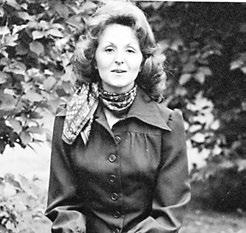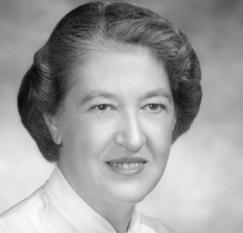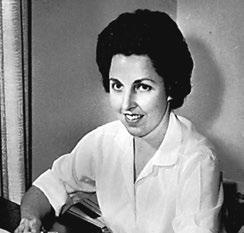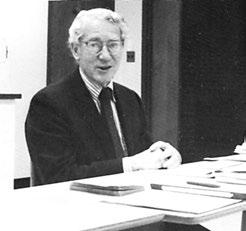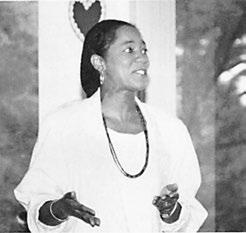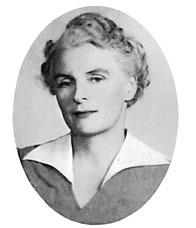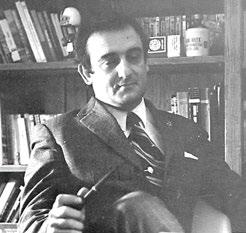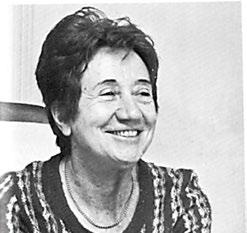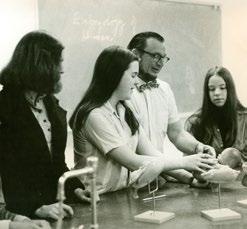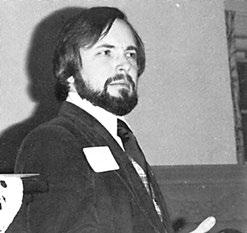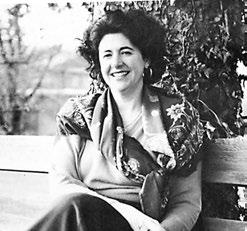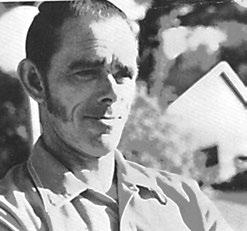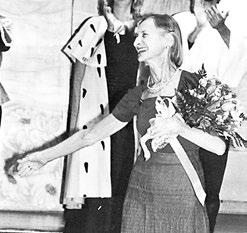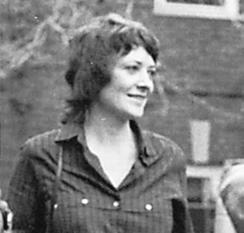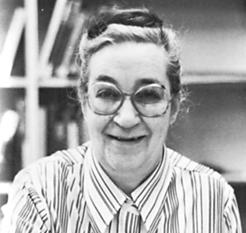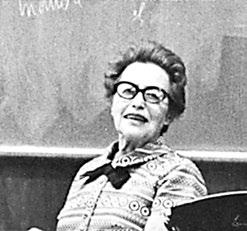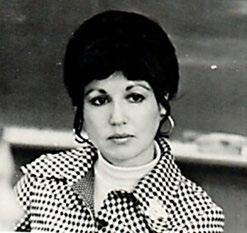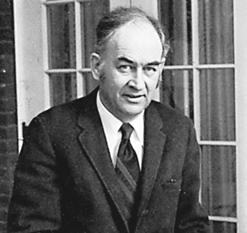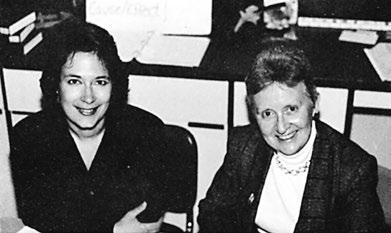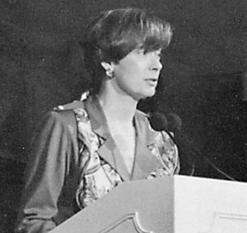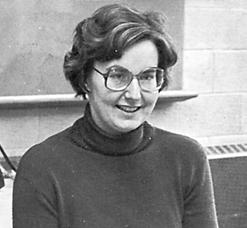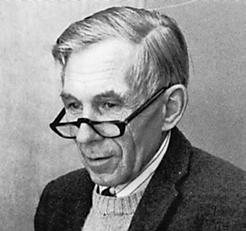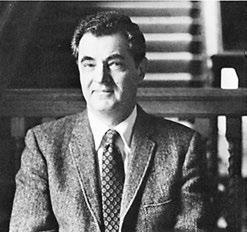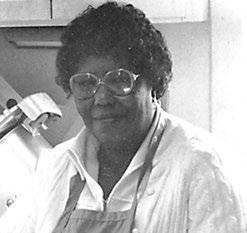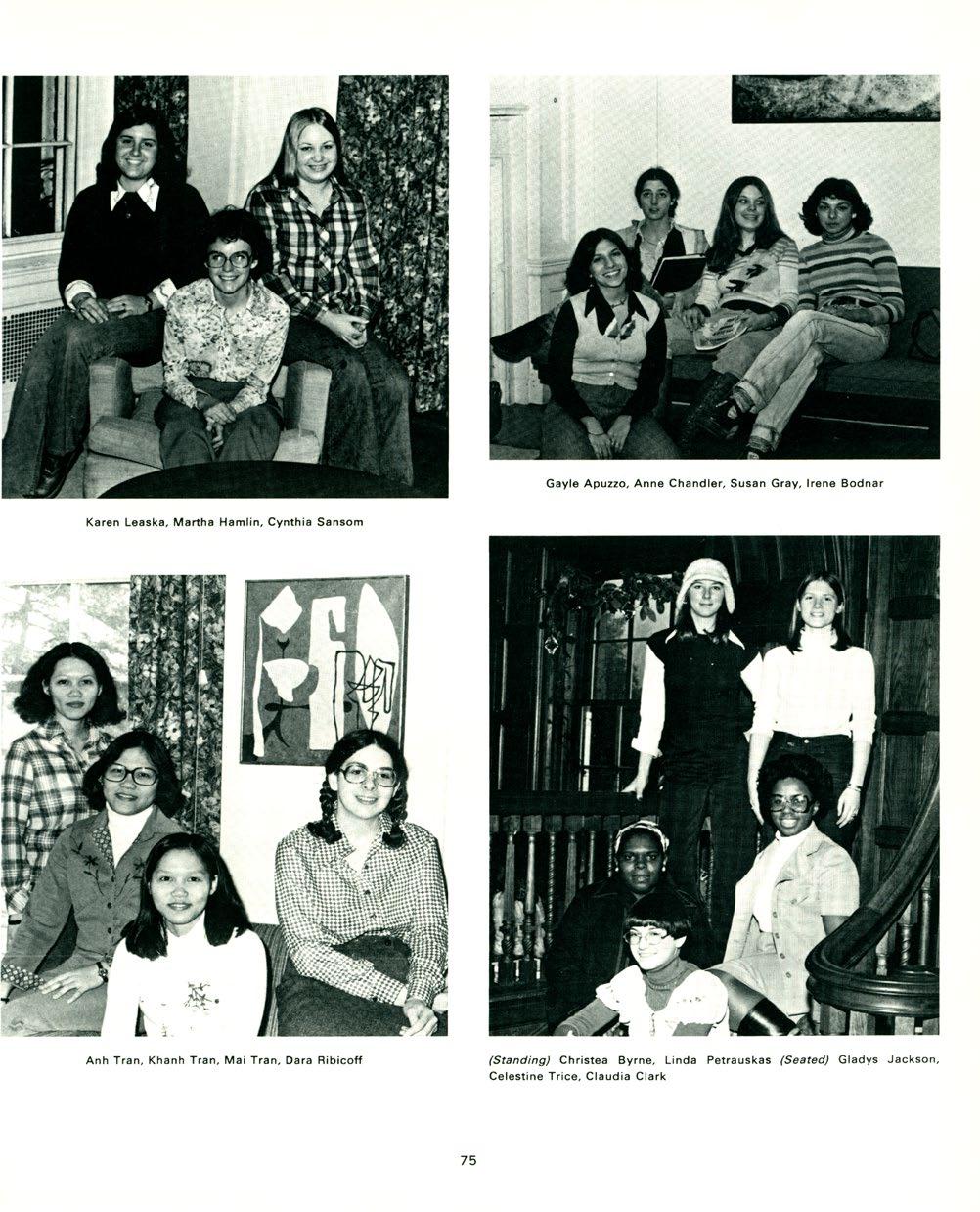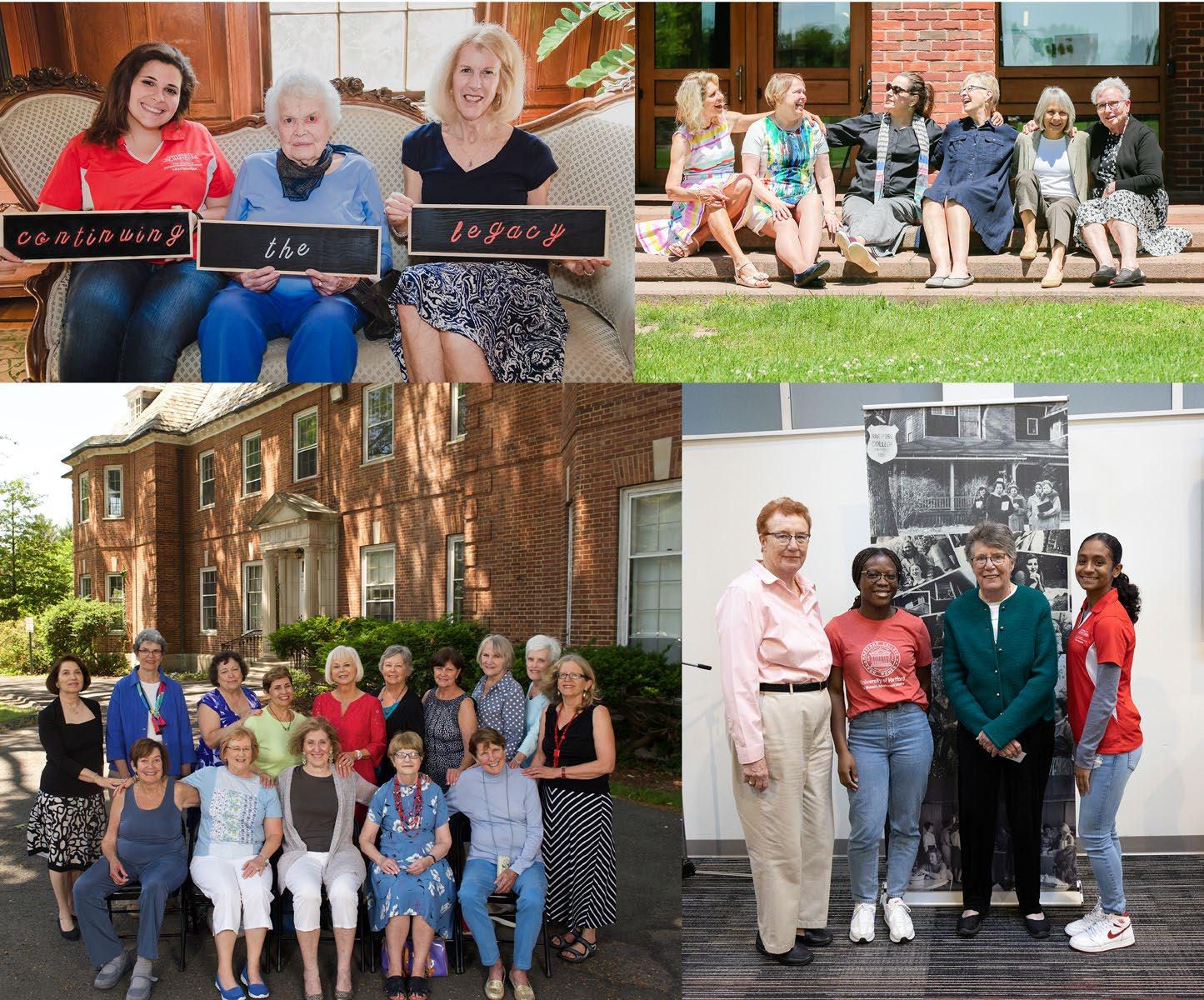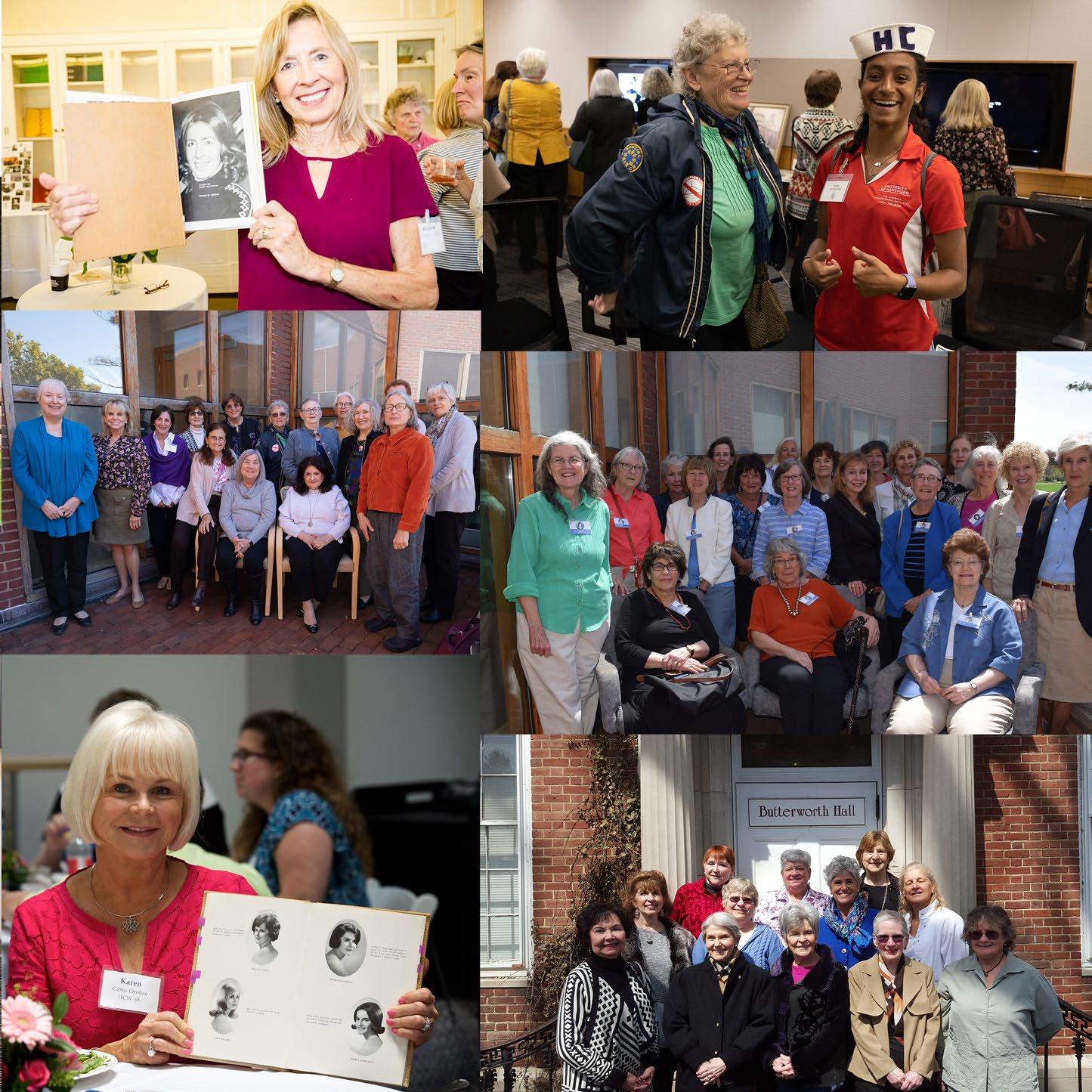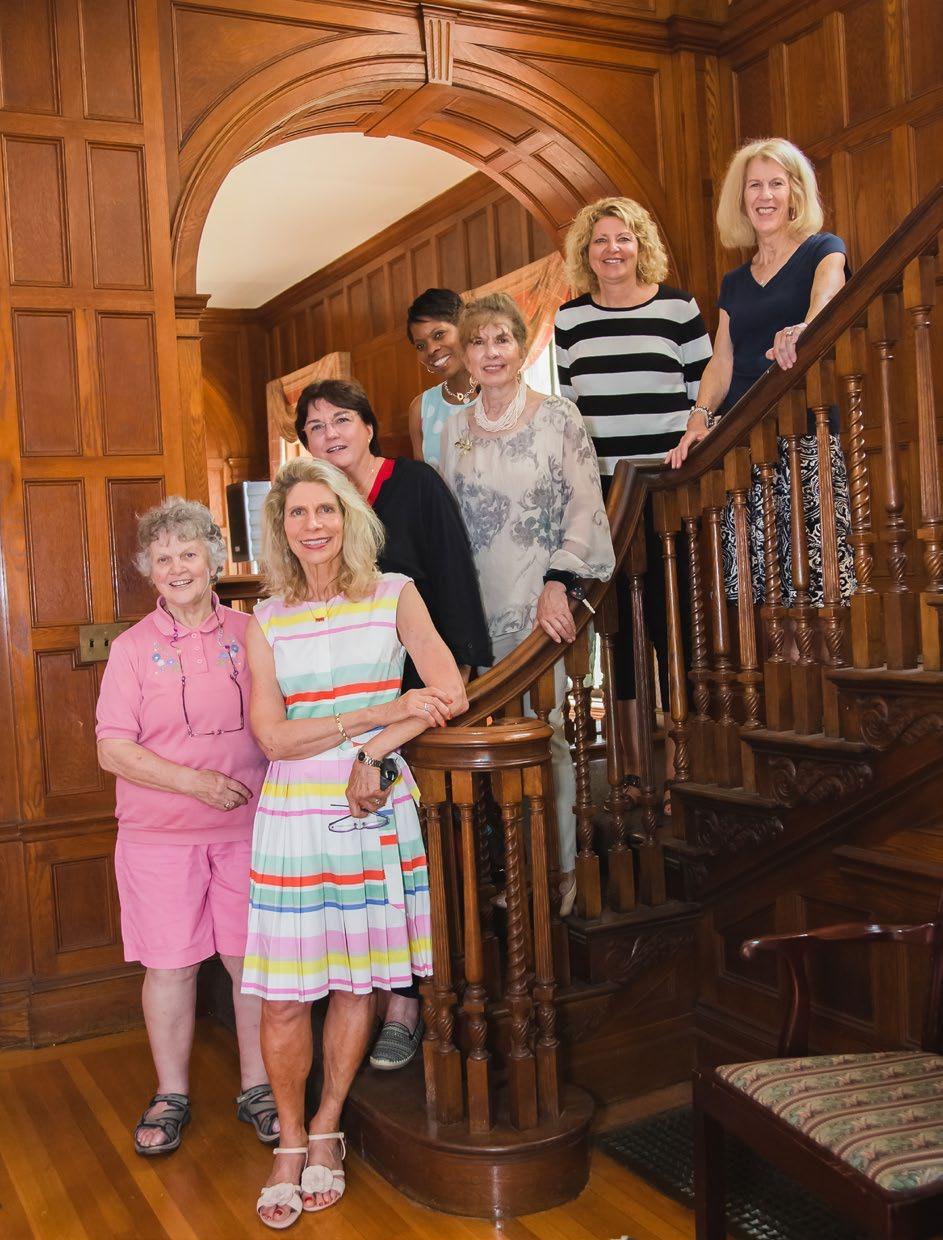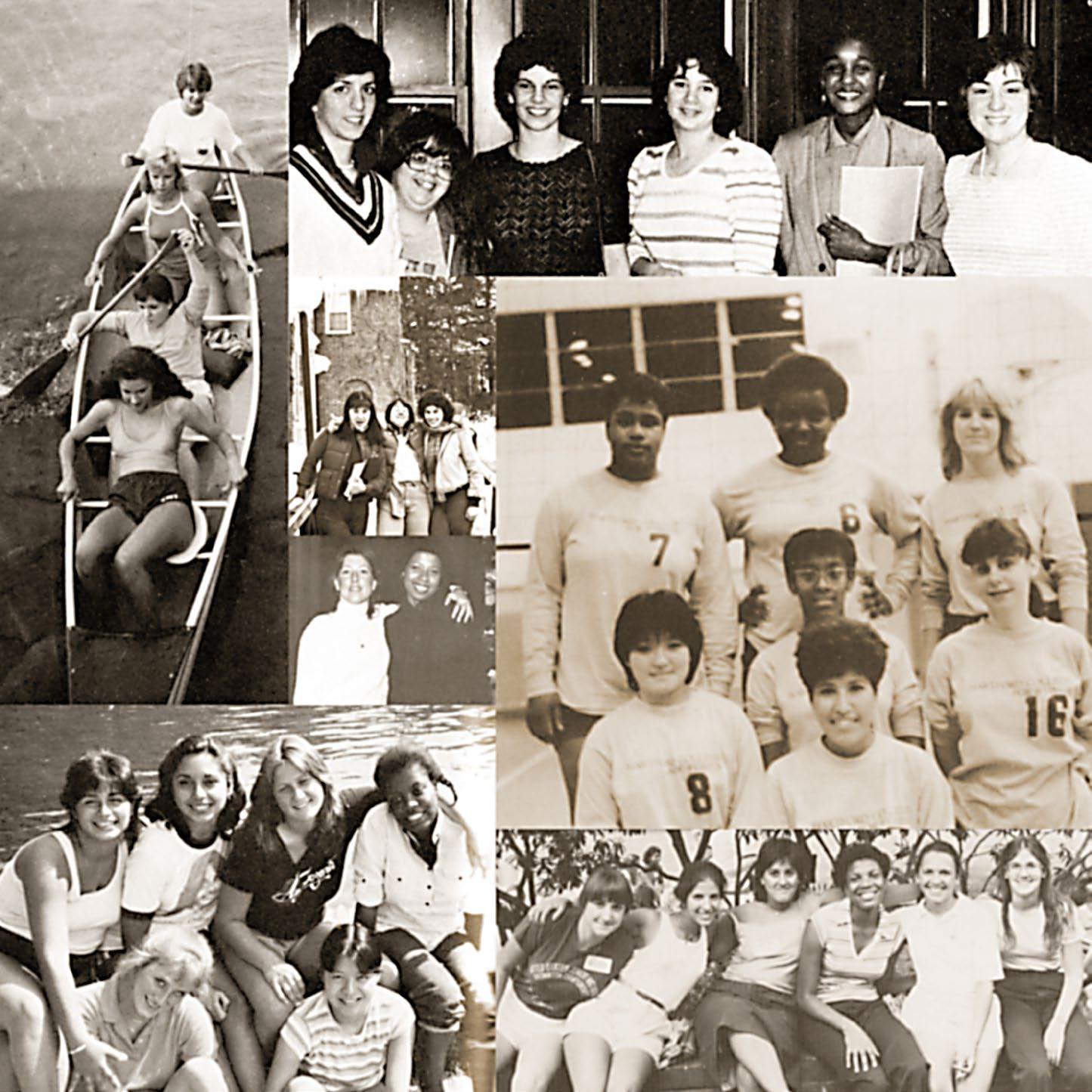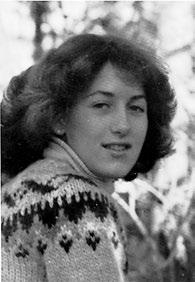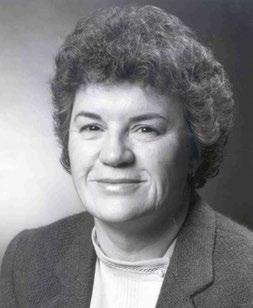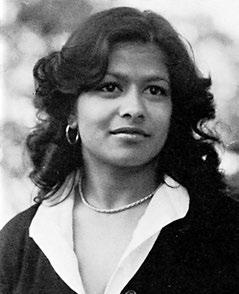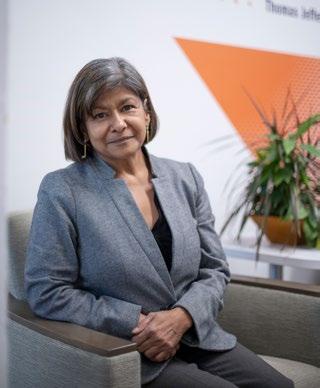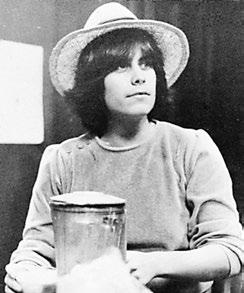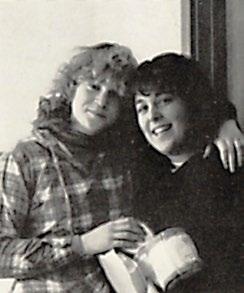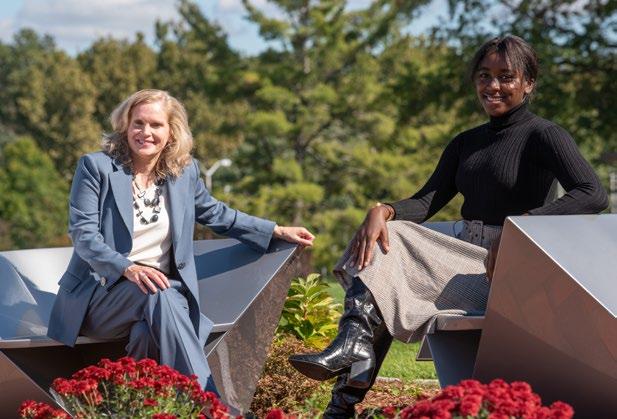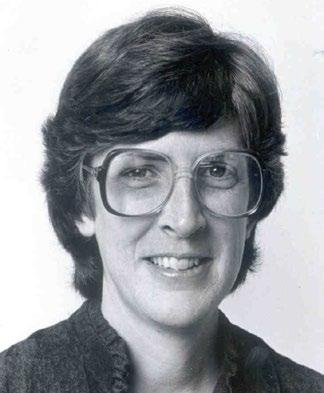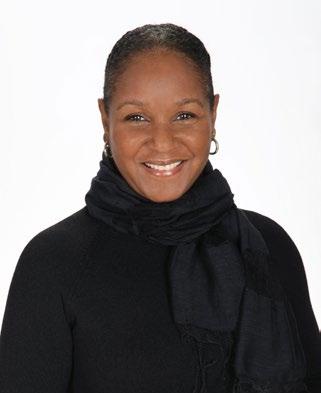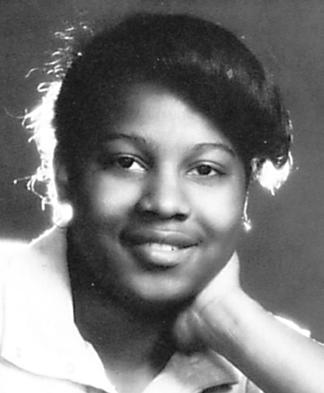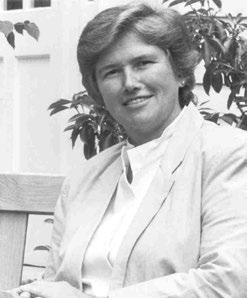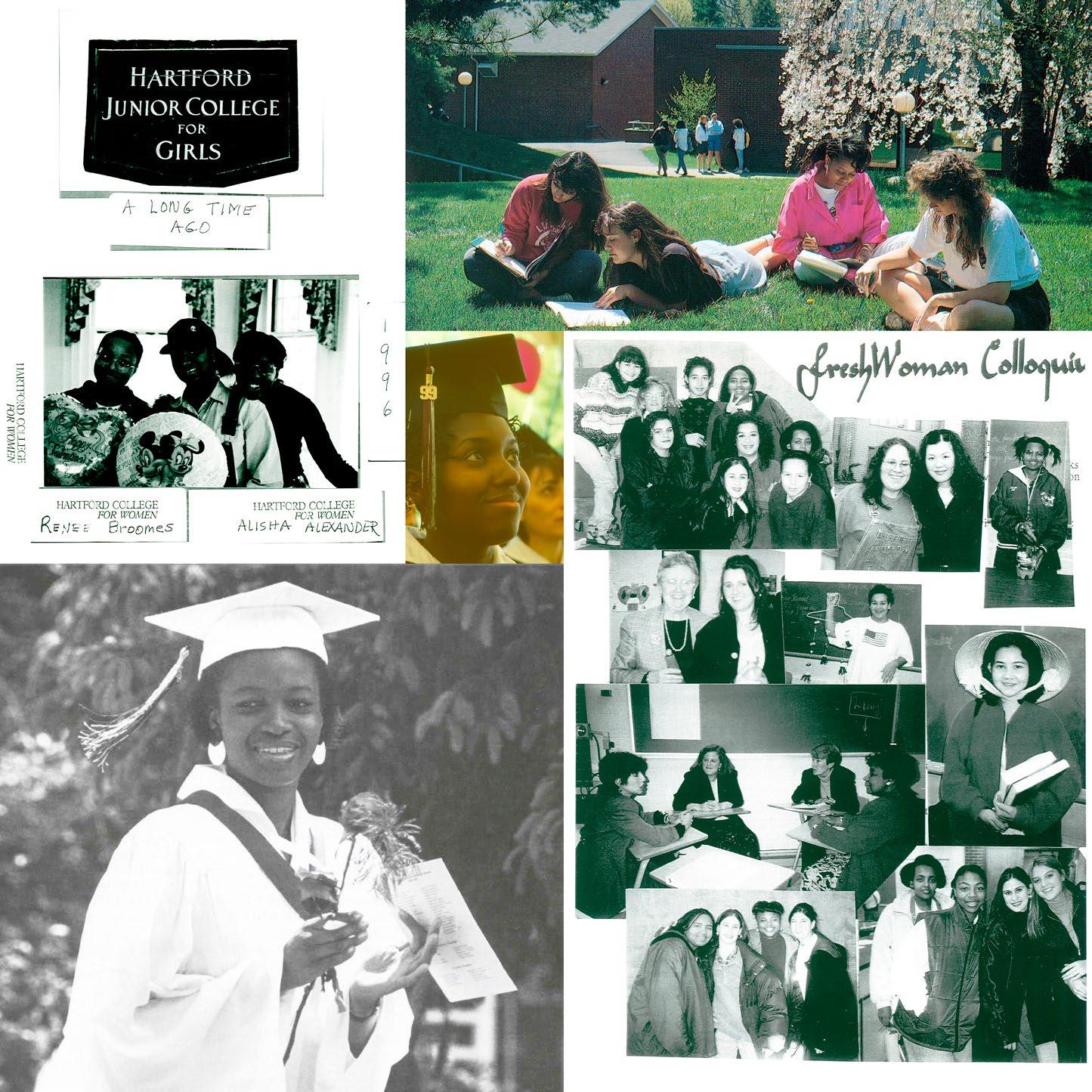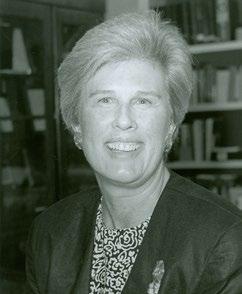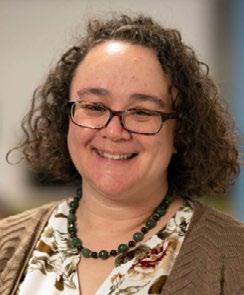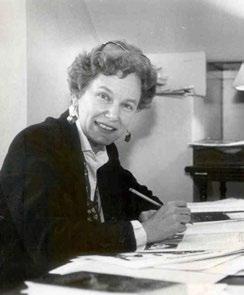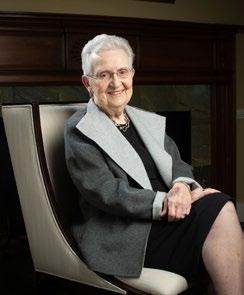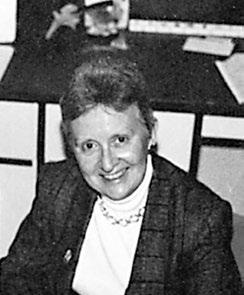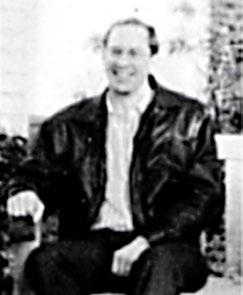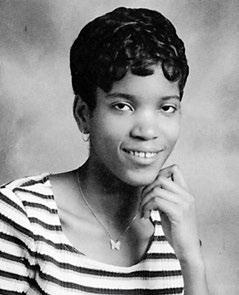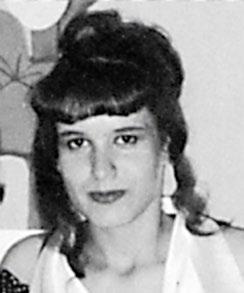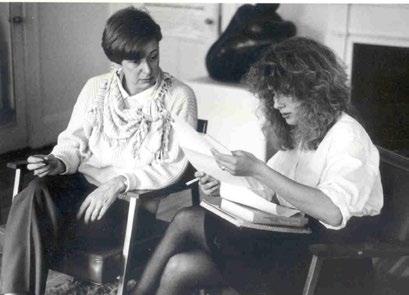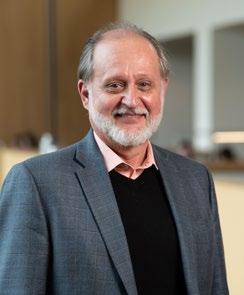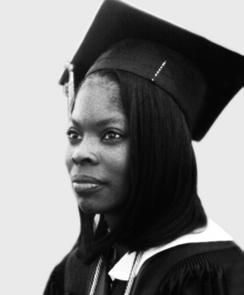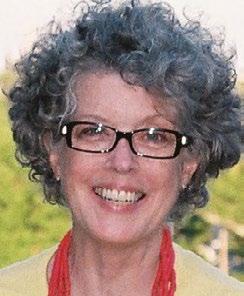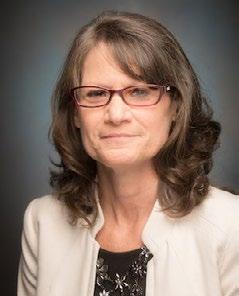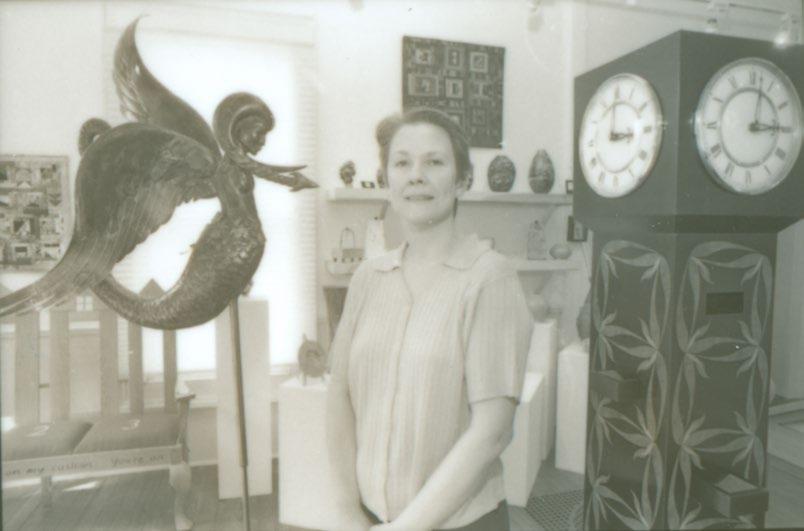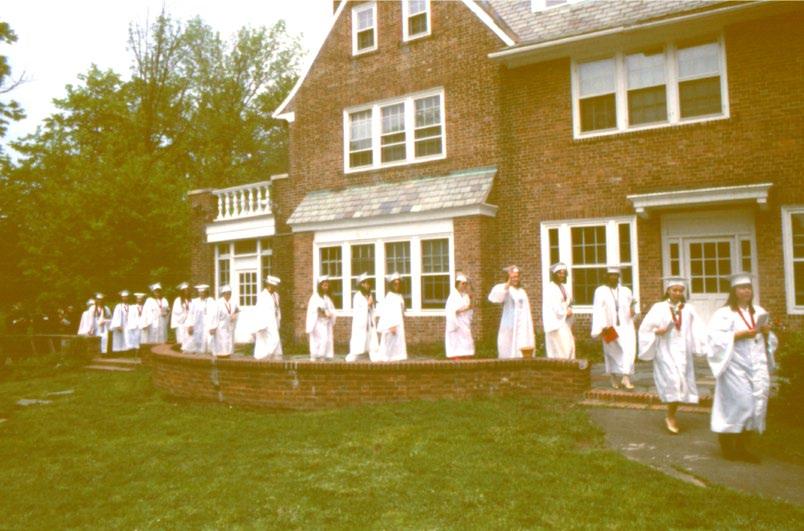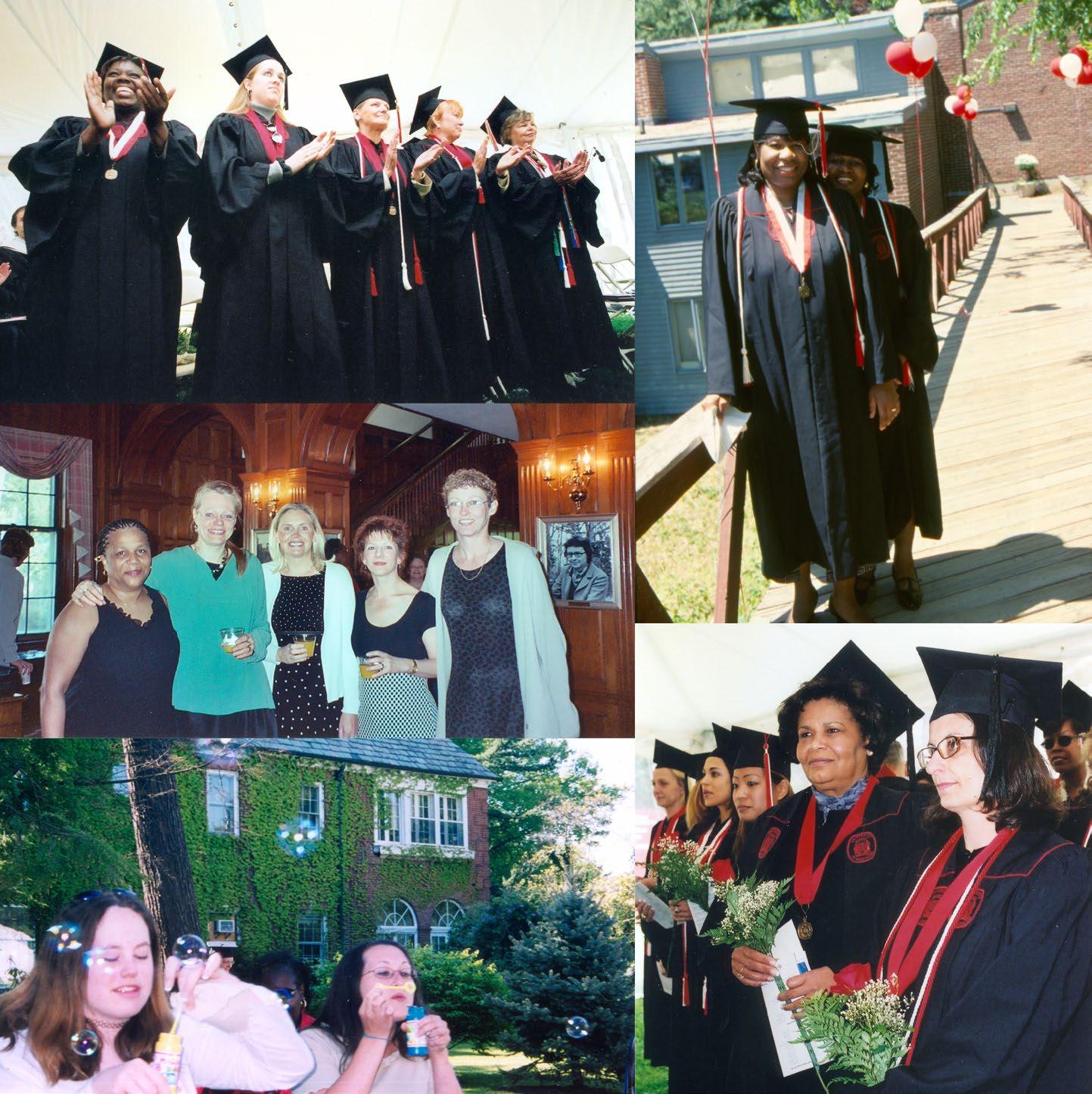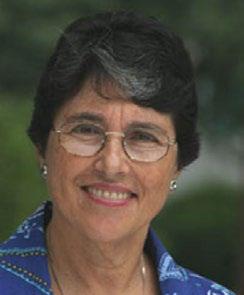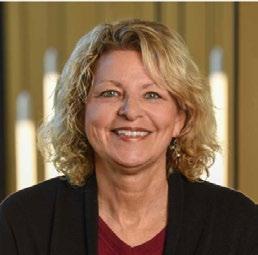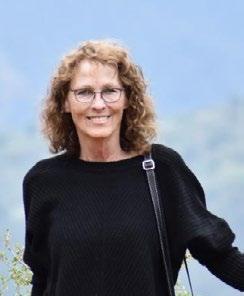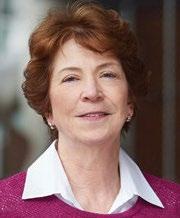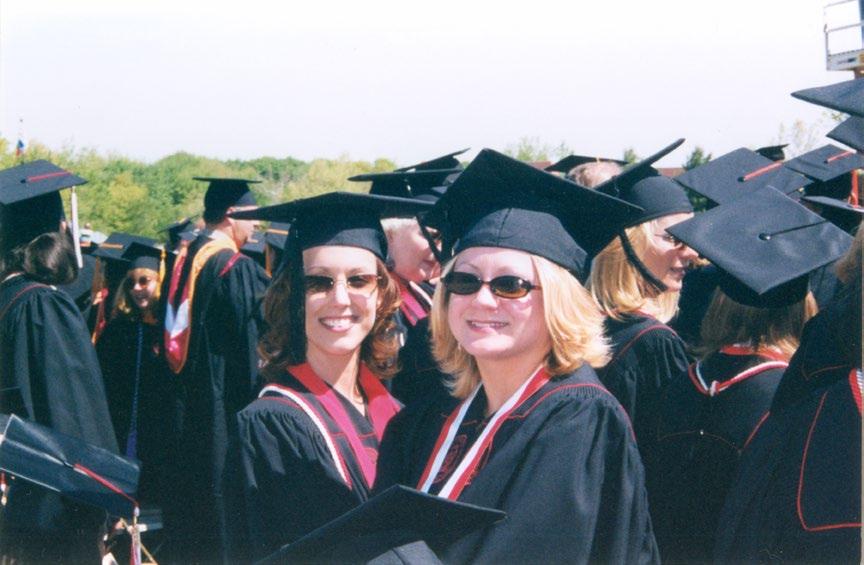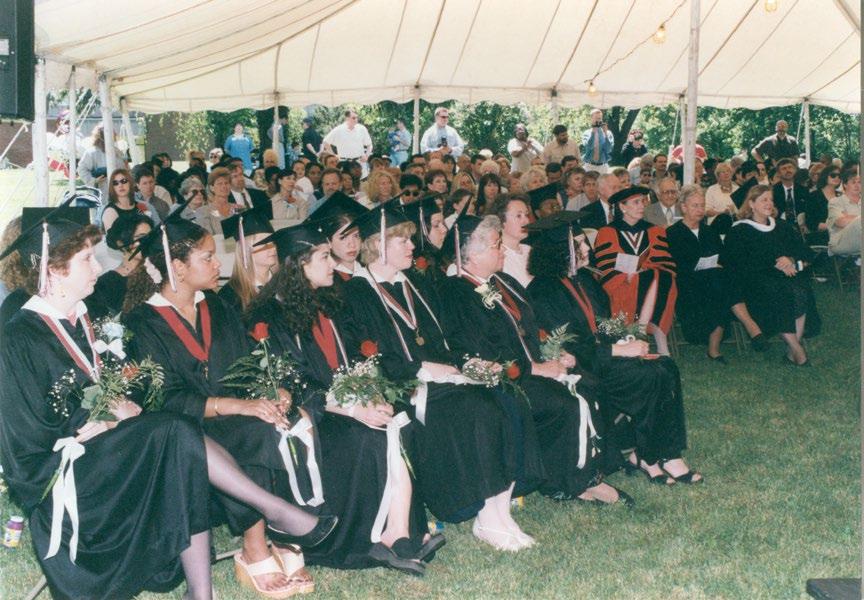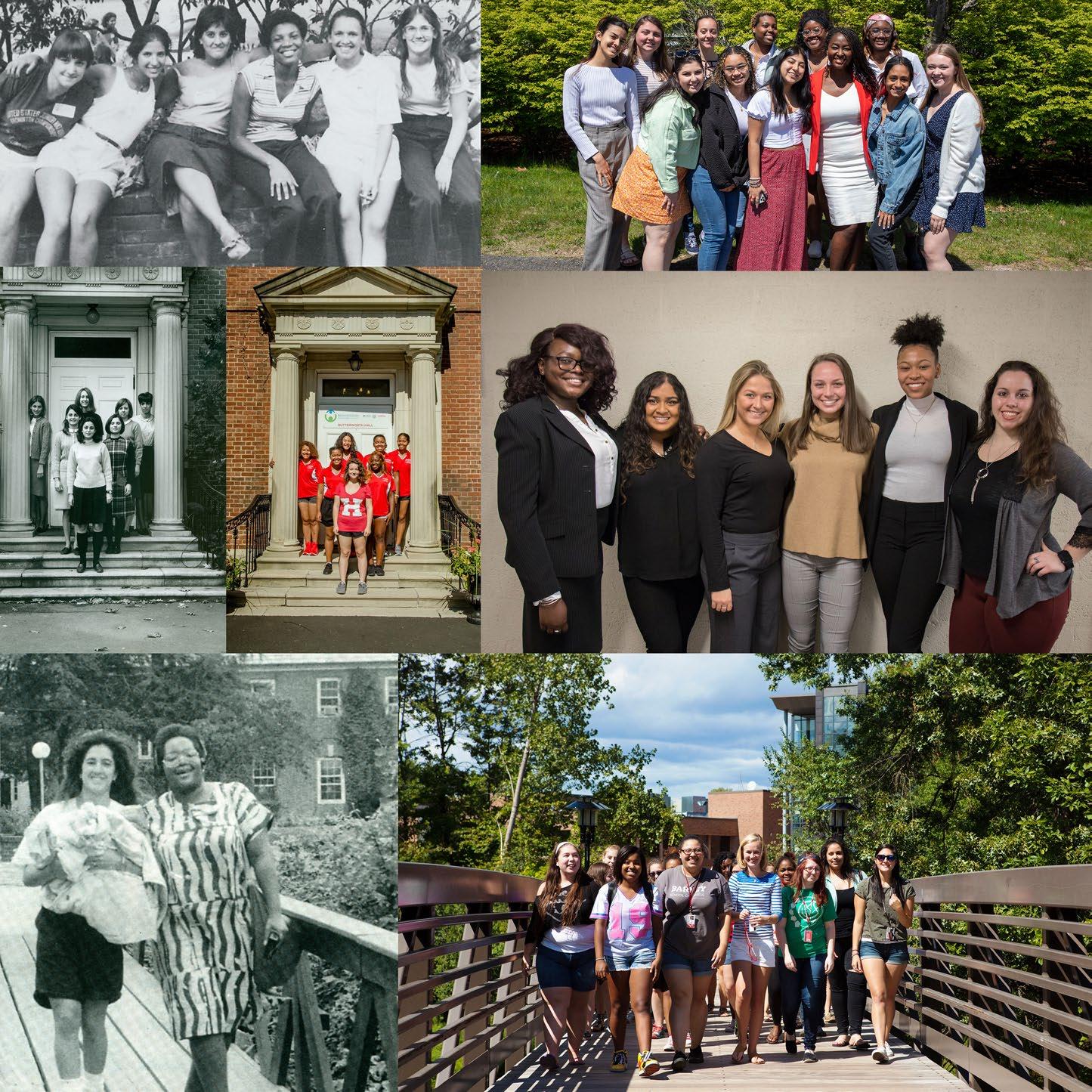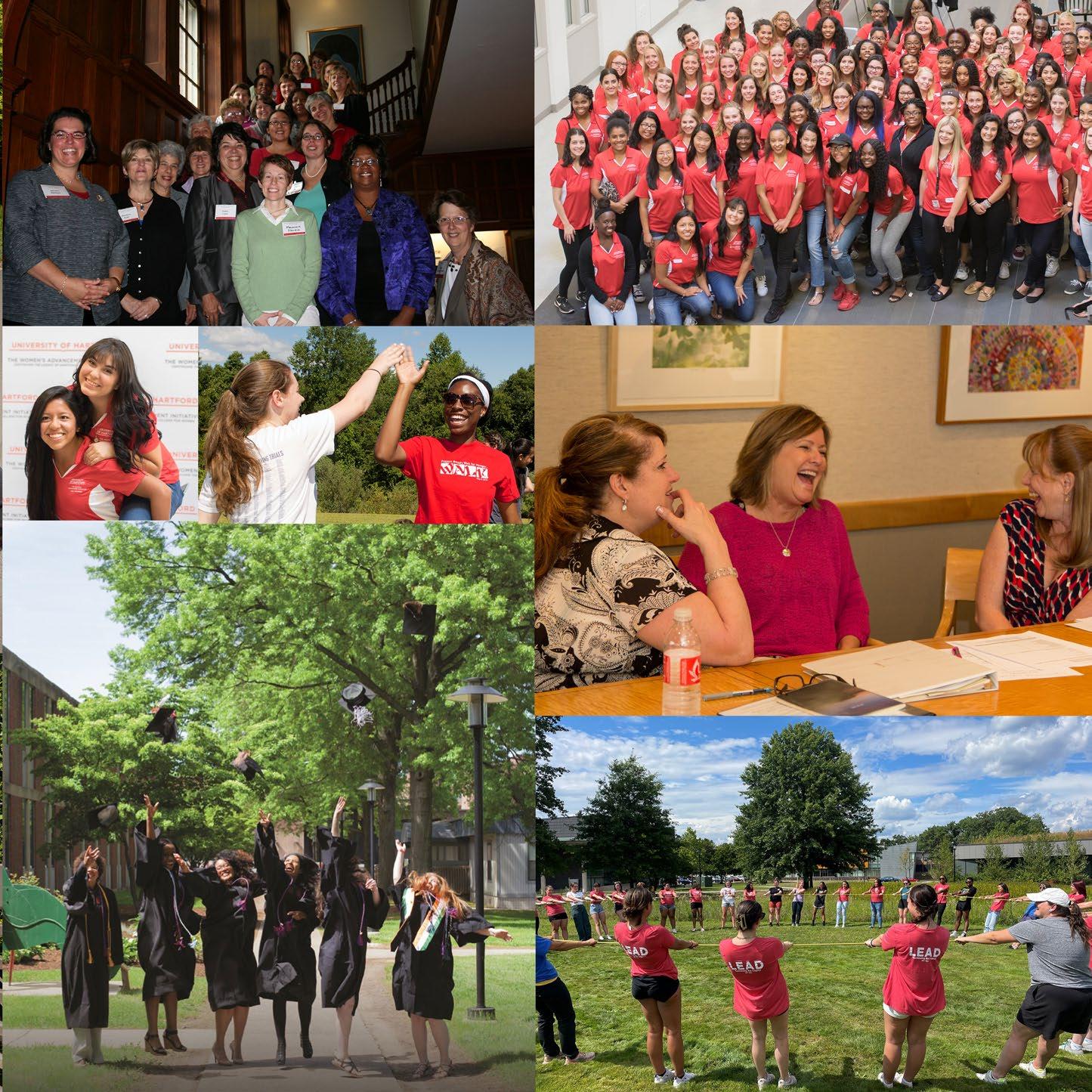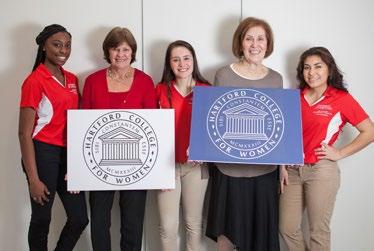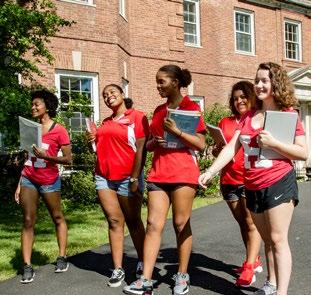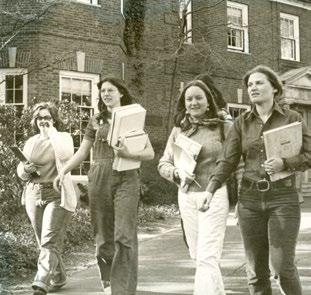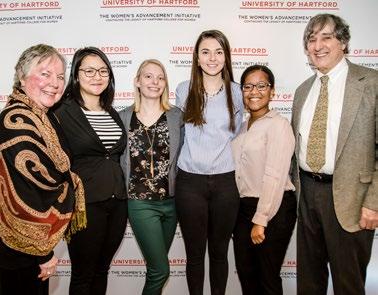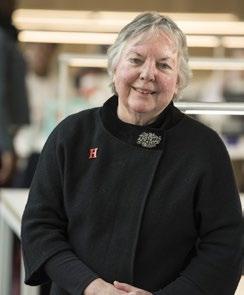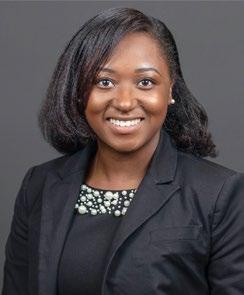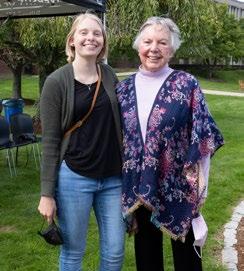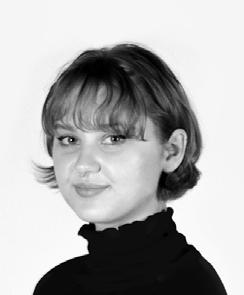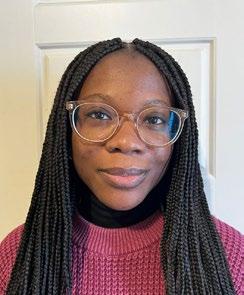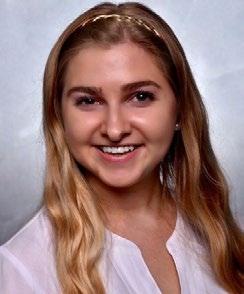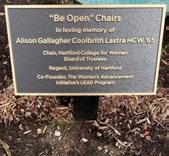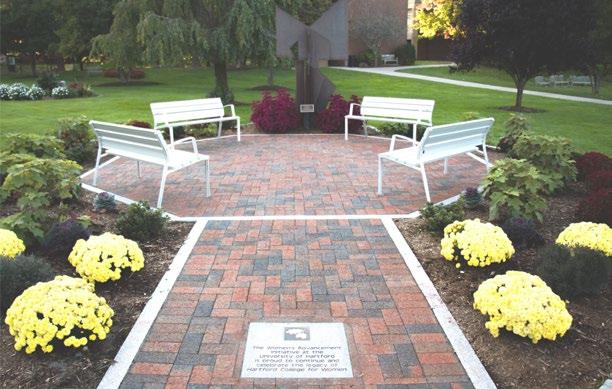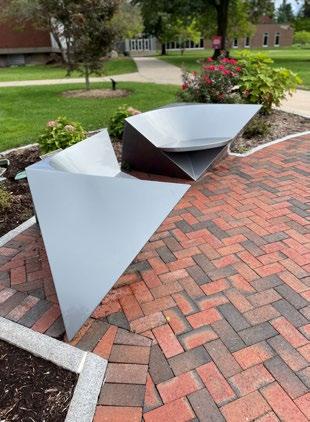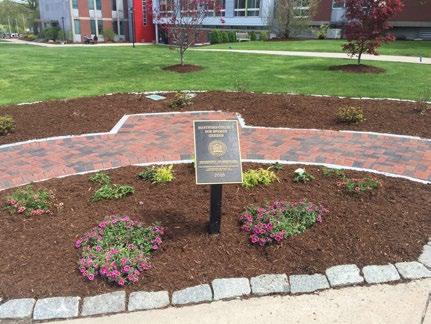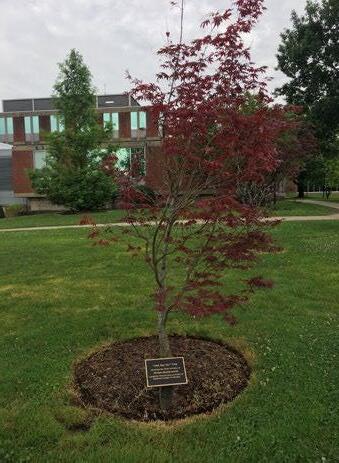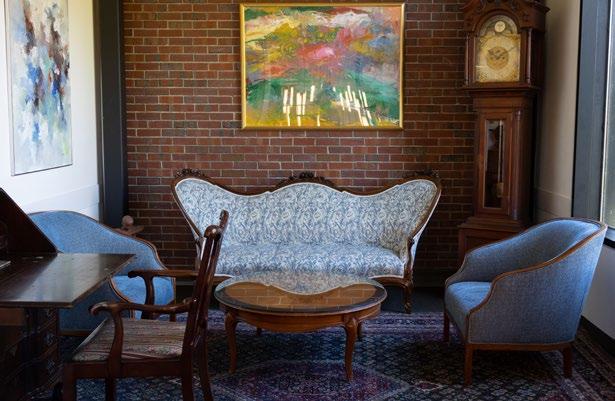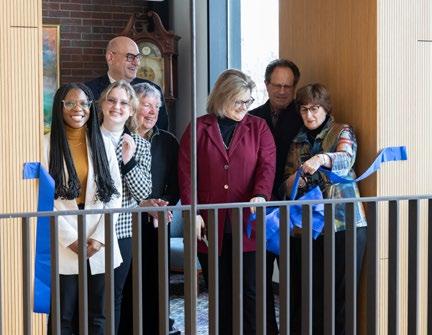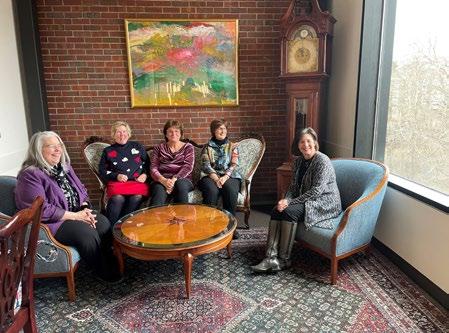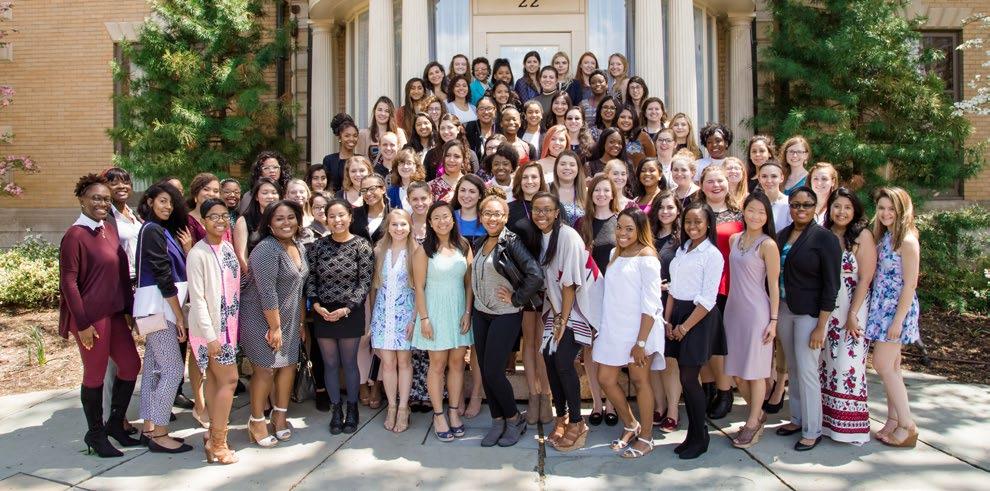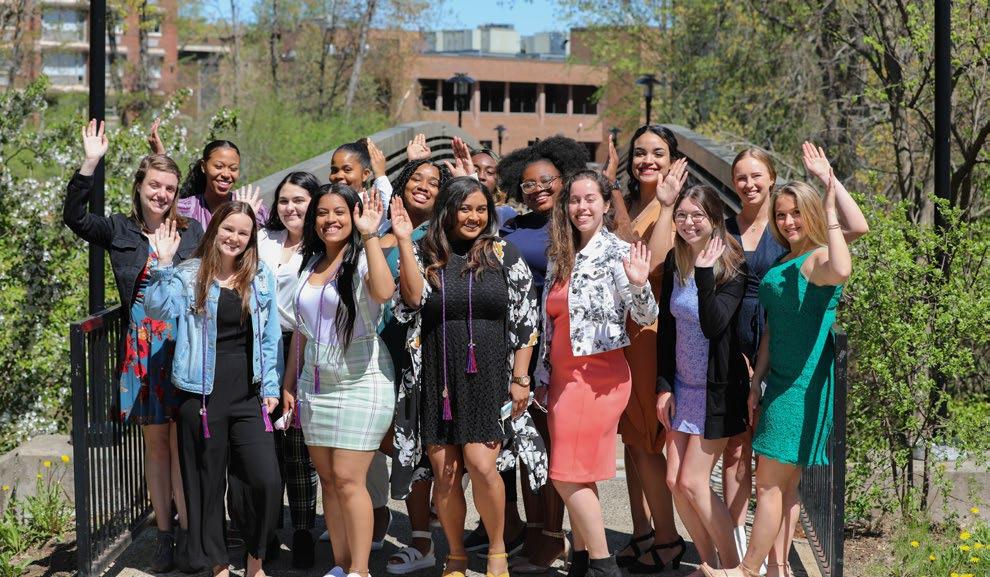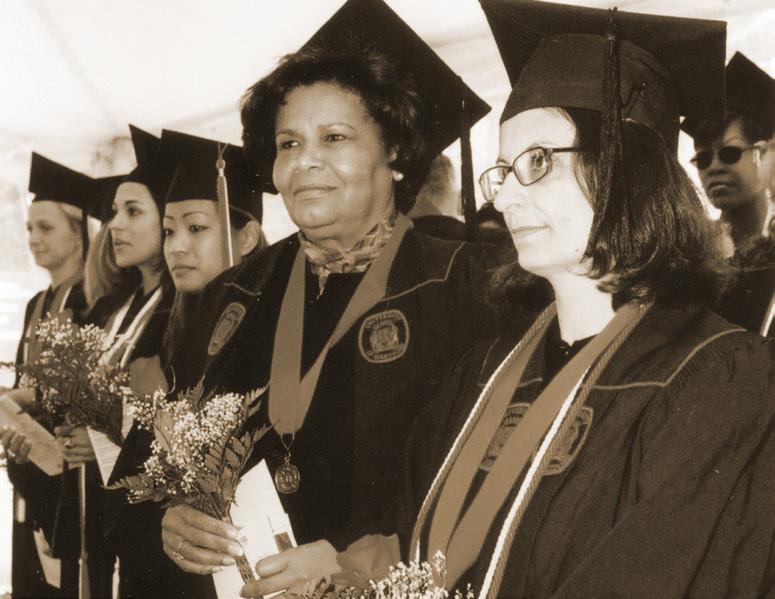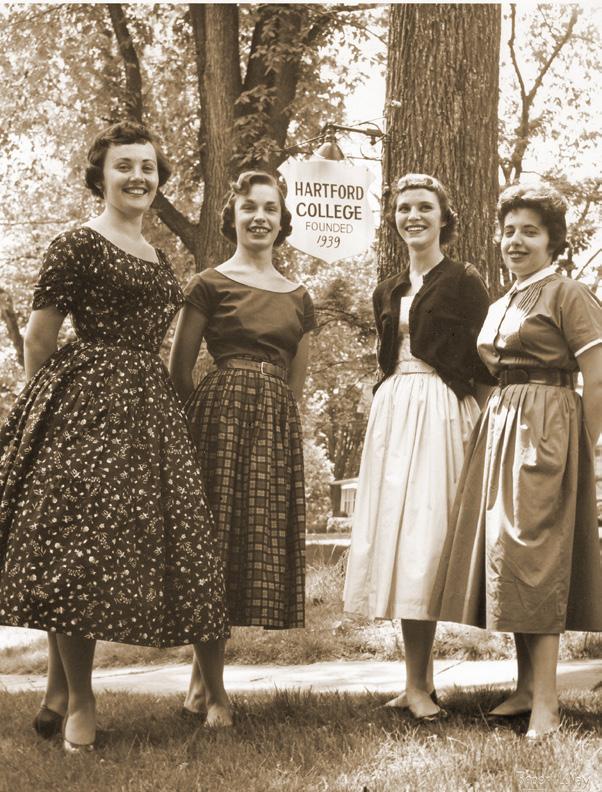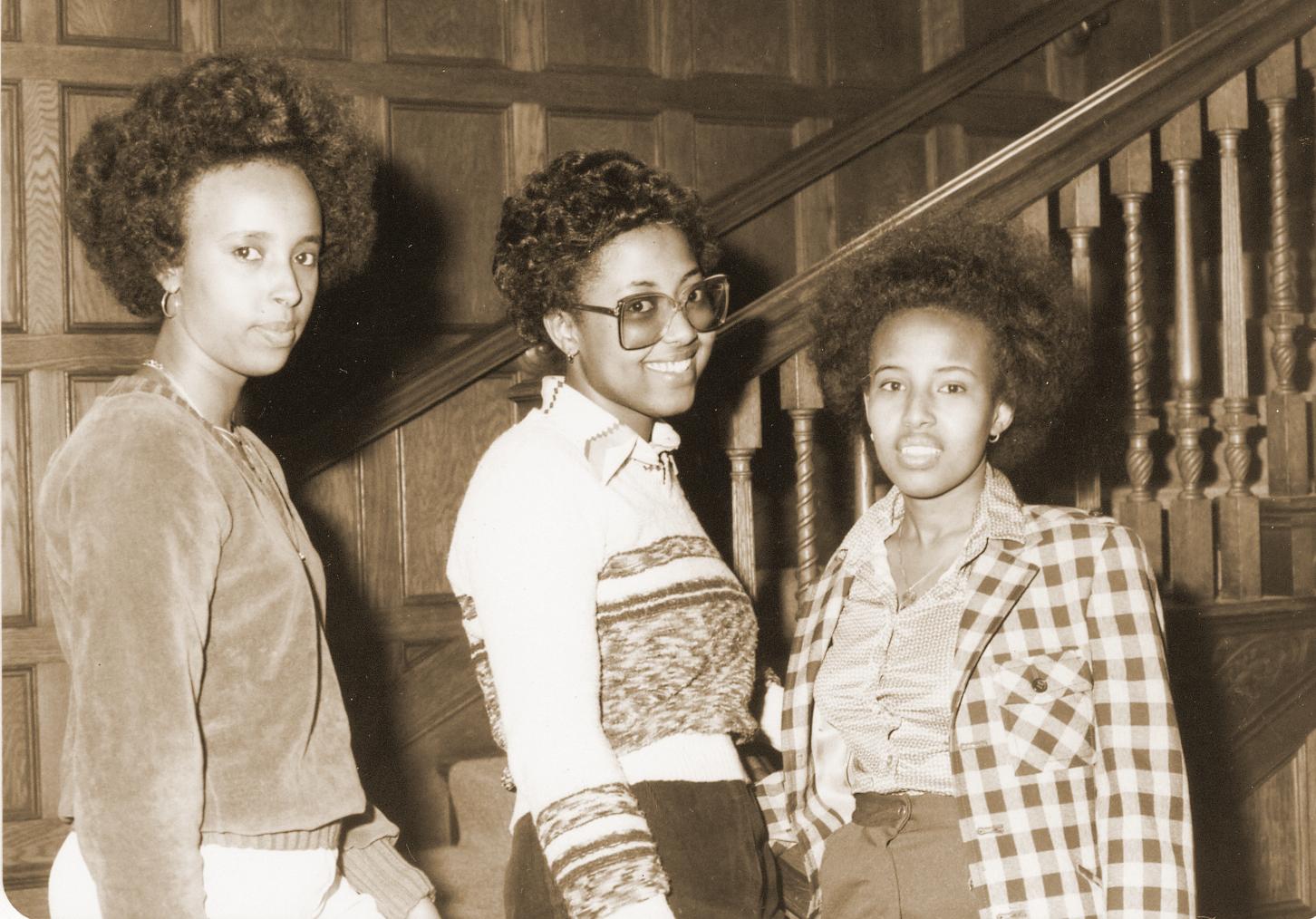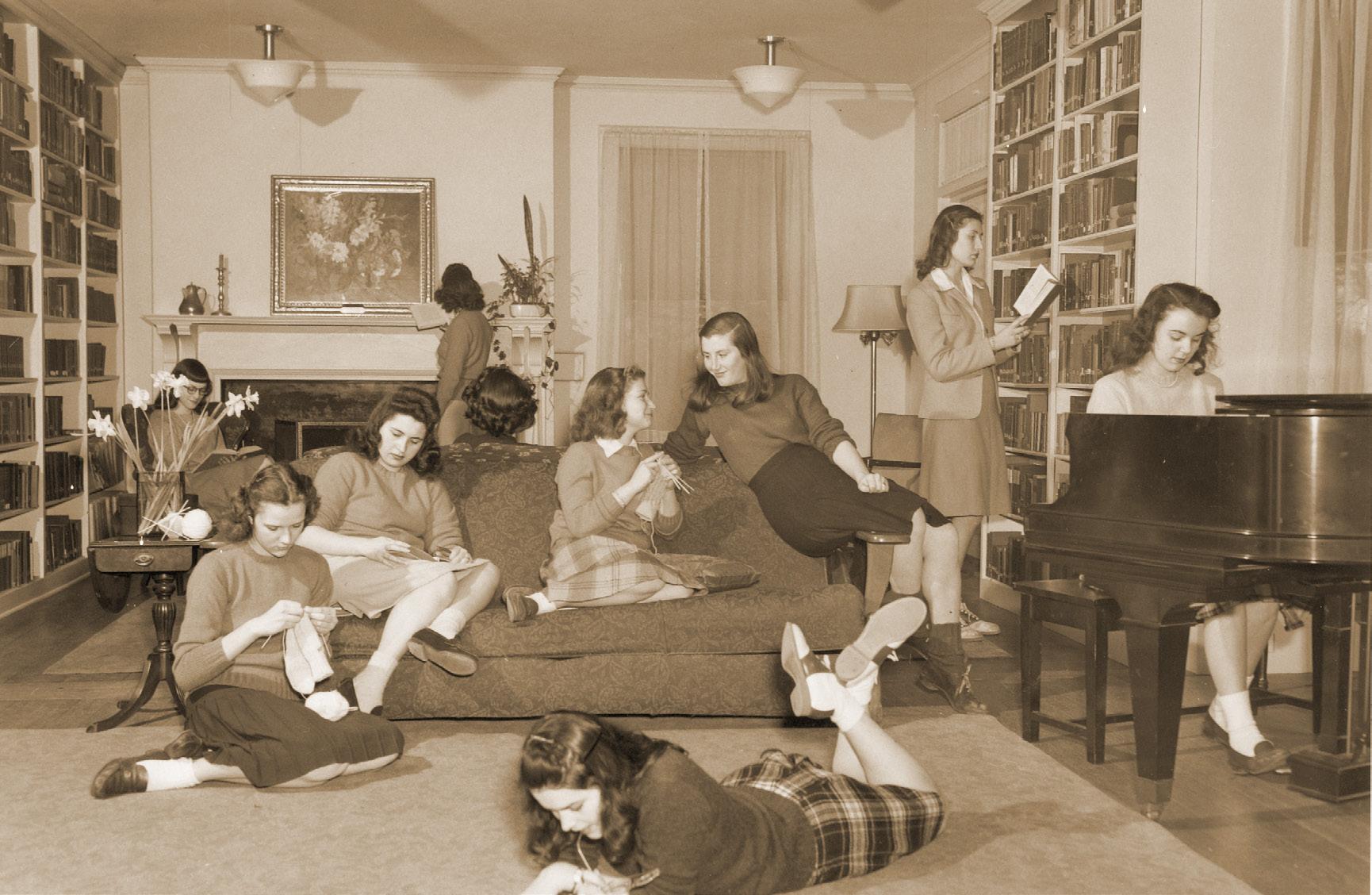90 Years of Educating Women in Hartford.


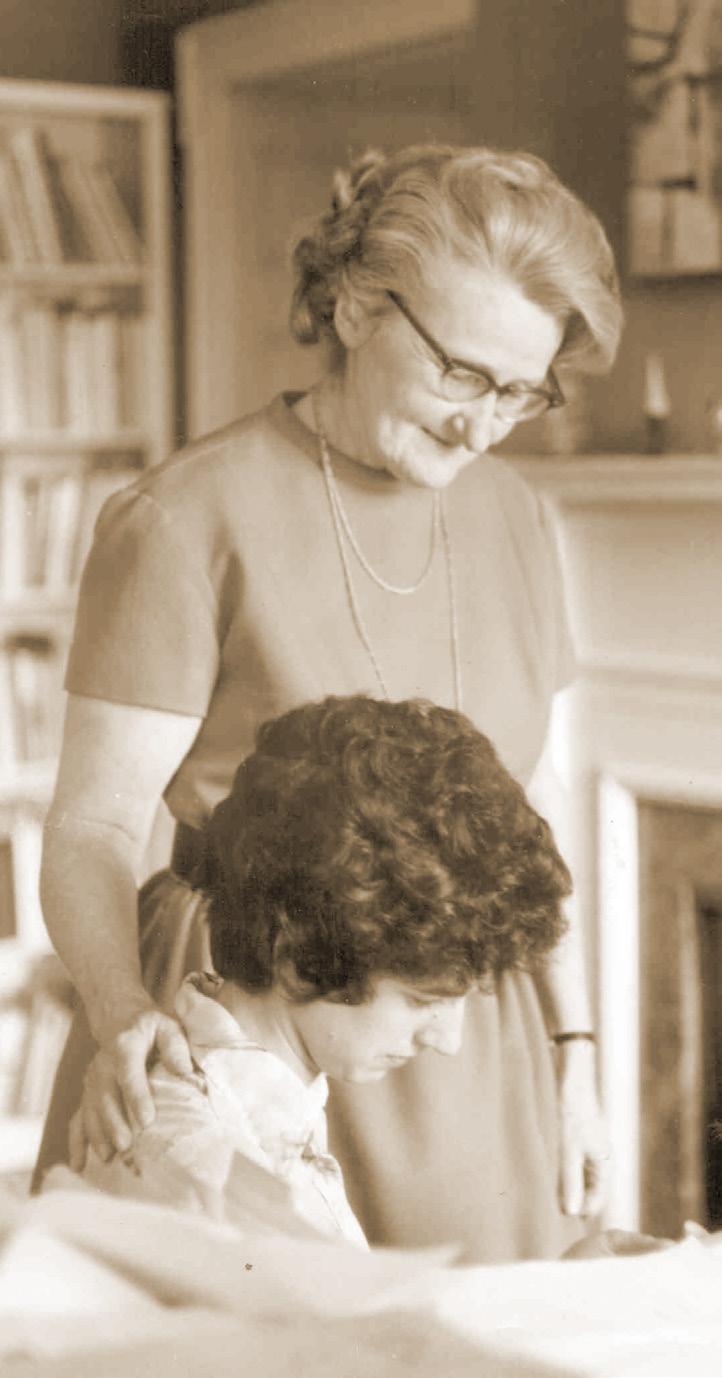


This book is dedicated to the 3,570 Hartford College for Women alumnae and hundreds of faculty, staff, trustees, and friends who made the College an empowering community and a special place that so many called home.
May we also remember those of the Hartford College for Women community we have lost with great fondness, joy, and celebration.
90 Women.
90 Stories.
90 Years of Educating Women in Hartford.


Mount Holyoke College in Hartford began as “a noble experiment” in women’s education and was the predecessor to what would become Hartford College for Women. The school opened its doors to 22 students at the YWCA in Hartford in 1933. Mary Woolley, who served as president of Mount Holyoke College, planted an acorn to signify the strength and potential of the College. The acorn also represented the inner potential women had to grow and be successful in their lives by expanding their learning.
In 1939, Hartford Junior College opened its doors on Highland Street in West Hartford, Connecticut, to 34 students enrolled in an expanded two-year program.
Dorothy Mylchreest Redmond ’36“For my first year of college, I lived at home and went to Mount Holyoke in Hartford. Twenty-four girls were inseparable, united with work, and played very hard. I felt it a great honor that the girls elected me president of the class. It meant lots of hard work, experience, and good fun. We did amazing things together but the crowning feat was a play acted, directed, costumed, and staged by us for President Woolley. We even managed a formal (and successful) dance for ourselves. Our soccer team also played well against Mount Holyoke College’s varsity team. We had our own college life and not one of us regrets that year when we could not go away for college.”
After graduating from Mount Holyoke in Hartford, Dorothy attended Wheaton College in Norton, Massachusetts. She also earned a library science degree from Syracuse University. She was a librarian and teacher in the Hartford public school system for nearly 30 years and the first librarian for Annie Fisher School. Dorothy was an active member of many historical associations. She passed away on May 20, 2002, in Fairfax, Virginia.
In 2021, to honor her mother’s commitment to education and affiliation with Hartford College for Women, Dorothy’s daughter, Jean Conrad, established the Dorothy Mylchreest Redmond Endowed Fund to benefit the LEAD program. The fund supports programming for today’s students and is managed by Scott Redmond.
Marion Bristol Bridge ’36
Marion attended Mount Holyoke in Hartford in 1936. Enjoying her time at the college, she recounted that her class gathered together at Dorothy Mylchreest Redmond’s home. They shared their Mount Holyoke in Hartford memories with fondness. She graduated in 1938 from the College of Wooster in Ohio. In 1939, she graduated from Mount Holyoke College in Massachusetts. She was a long-time librarian in Monterey, California, and died peacefully in the presence of her family on April 6, 2006, at the age of 90.
“Mount Holyoke in Hartford seems like a very long time ago. Another lifetime. I am grateful for that good year, so much better than those that followed. I remember many of my classmates fondly and our teachers who now seem to me like characters mildly surprised at the naive bunch of students they inherited. I recall many details of that year vividly…including the beautiful house where the Bristol girls lived. I would love to know what has happened to everyone.”
Winifred enjoyed all the great things that the school provided, ranging from classes to meeting new people. After leaving Mount Holyoke in Hartford, she attended Bennington College to take dance classes with Martha Graham. She later received a bachelor’s degree in studio art and English. In her life, she took the values instilled by Mount Holyoke in Hartford and applied those to the many things she did afterward, accomplishing a great deal of feats. She died peacefully in her sleep on December 16, 2013, at the age of 95.

Blanche Babcock was the president of the YWCA Hartford. She also served as a longtime Hartford Junior College Trustee (1939–80). The Babcock Building on the Hartford College for Women campus was dedicated to her hard work and commitment to women’s education and success.

Bess Frazier Graham Director of Education, YWCA Hartford Hartford Junior College Trustee (1939–43)
Bess Frazier Graham was an integral part of the “noble experiment” as she served as director of education at the YWCA in Hartford. The YWCA housed and helped establish Mount Holyoke in Hartford in 1933. Together with Blanche Babcock and Mary Woolley, she helped Hartford Junior College became a leader in women’s education. In 1939, she became a trustee of the College. Graham Library served as a tribute to her on campus.


First Dean, Hartford Junior College (1939–40)
Helen Randall was the first dean of Hartford Junior College. Among her contributions, Randall was instrumental in donating many books to help enrich the available resources for the library.

Howell Cheney
Trustee, Mount Holyoke College (1912–26, 1930–40) Chairman, Hartford Junior College and Hartford College Board of Trustees (1939–55)
In 1939, Howell Cheney, a Connecticut native, trustee of Mount Holyoke College, and successful businessman, led the reorganization and incorporation of Hartford Junior College as chairman of the board of trustees. His vision for the new Hartford Junior College is that it “rank with well-known educational institutions of higher learning.” In 1944, the students dedicated the first yearbook to him.

The Butterworths: A Hartford College Family Legacy
The Butterworth’s relationship with Hartford College began in the late 1930s with Paul Butterworth and his sisterin-law, Elizabeth Butterworth, as the college transitioned from “Mount Holyoke College in Hartford” (located at the YWCA in Hartford) to “Hartford Junior College” (located on Highland Street in West Hartford). Paul and Elizabeth were considered visionaries and pioneers in their dedication to, and philanthropic support of, women’s education. By the late 1940s, Paul served as chairman of the board of Hartford College. Elizabeth also served on the board of trustees.
In 1957, Paul helped negotiate and acquire the 13-acre Seaverns estate property that became the new home in 1958 for Hartford College for Women at 1265 Asylum Avenue. He also predicted the importance of Hartford College for Women’s long-term relationship with the University of Hartford, a vision that would not come to fruition until years later.
In 1960, the Seaverns home was named Butterworth Hall in recognition and honor of Paul and Elizabeth’s contributions and commitment to the College. Butterworth Hall became the central gathering place for students and housed the College’s administrative building, President Laura Johnson’s office, and the library. In 1980, a cherry tree was planted on the grounds of the property in Paul Butterworth’s memory.

Like his father Paul, Oliver Butterworth was also philanthropic and devoted to Hartford College for Women and the education of women. Oliver taught English at the College for more than 40 years, accepting $1 a year as a stipend. In 1940, he married Miriam “Mims” Brooks. Oliver and Mims were beloved by the students. They hosted many student dinners and ice cream socials in their Sunset Farms home in West Hartford. Oliver often took students to the playhouse in Hartford, organized the annual Medieval Banquets, and started the tradition of celebrating Shakespeare’s birthday on campus.
In 1979, Mims stepped in as the Hartford College for Women acting president until 1980. Mims brought to the College a strong background as a devoted educator, savvy business woman, administrator, and public policy voice on many social issues, including an undying commitment to women’s education and leadership. In 1980, Karen Petersen, artist and art
professor at Hartford College for Women, created the Miriam B. Butterworth Art Gallery on the College’s campus, featuring notable art, including that of its students and Karen Petersen herself. The Gallery was a center for special events, including portraits from the Connecticut Women’s Hall of Fame.
The Butterworths have also left their mark on today’s LEAD program, a unique Hartford College for Women legacy program for women students at the University of Hartford. Mims’ “Just Say Yes” philosophy is integrated into the heart of LEAD student teachings—to “just say yes” and embrace life’s challenges, adventures, and opportunities, in addition to learning how to say “no.” In 2020, the Miriam and Oliver Butterworth & Family LEAD Program Endowed Fund was established to underwrite the cost of students’ participation in the program.
We thank the Butterworth family for their years of dedication, devotion, wisdom, and philanthropy, contributing to the great history and legacy of Hartford College for Women and enriching the lives of its students.

In addition to being the second dean of Hartford Junior College, Grace Frick served as an associate professor of English.



Hartford College for Women owes much of its academic prestige and reputation to Laura Johnson who became the third dean of Hartford Junior College in 1943. She graduated from the University of Vermont and held two masters degrees, one from the University of Vermont and the other from Radcliffe College. Johnson’s vision was for women to be challenged with academic rigor and “intellection exertion,” while building a supportive inclusive community of staff, faculty, and students, with a diversity of attitudes and backgrounds. She is described as “the woman who most fully defined Hartford College for Women.” In a tribute to her in 1969, Chase Woodhouse, then director of the Service Bureau for Women’s Organizations, wrote that, “President Johnson has done more for women’s education, women’s status, and women’s employment in jobs on a level with their abilities than most educators have done in a lifetime.”


In 1958, with the move of Hartford College to the Seaverns Estate at 1265 Asylum Avenue in Hartford, Johnson moved both her residence and main office into the Seaverns home, which served as the main administrative building for the College. The College community became Johnson’s family, welcoming visits to her office from students, faculty, and staff. She was fond of holding tea, sharing her unique collection of tea cups, and hosting tea for incoming classes. The College retained a domestic, family-like, nurturing environment for all throughout its history, set by Johnson’s personal style. She established it as a place for “faculty who loved to teach and students who loved to learn.”

Her sensitivity to traditionally feminine concerns helped her to reach out to women of all ages. During Johnson’s tenure, the College expanded its mission to offer additional programs to both traditional and “non-traditional” students, including programs in nursing and retail, and in 1968, programs for older women in transition into the workforce through the Counseling Center. Johnson worked tirelessly to help students transfer into some of the most prestigious colleges in the country, including Smith, Mount Holyoke, Radcliffe, Vassar, and Wellesley, among others.
In 1972, Johnson joined other colleges and universities in a partnership with Trinity, St. Joseph’s College, and the University of Hartford, known as the Consortium of Higher Education. The Consortium developed a program allowing undergraduates to take courses at the other colleges without paying additional fees. The four colleges created joint graduate programs in the late 1970s. During that time, the Consortium satisfied Hartford College for Women’s need for more course offerings and gave its students a taste of co-education. In 1973, the Laura Johnson Scholars program was also established for women entering and/or returning to college beyond traditional student age.
Johnson’s commitment to service was demonstrated not only in her attention to the Hartford College community but also to the Greater Hartford community. Johnson was the first woman to be elected to The Hartford Courant Board of Directors. In 1972, she became a director of Phoenix Mutual Life Insurance Company, the first woman to serve as a director in a Hartfordbased insurance company. She also served as a trustee of many colleges, schools, and other nonprofit organizations.
Laura Johnson retired in 1976. She had presided over the College for many years, from the beginning of Hartford’s commitment to women’s education as Mount Holyoke in Hartford, through changes as Hartford Junior College, Hartford College, and finally Hartford College for Women. She had a comprehensive view of the College and always welcomed a visit from faculty, staff, and students. Clearly, Laura Johnson, once described as a
“Champion of Girls’ Education” had taken Hartford College for Women from a modest “noble experiment” as Mount Holyoke in Hartford to an established presence in Hartford educational circles. After retiring, Johnson moved to Farmington Woods in Avon, Connecticut. During her last years, she pursued her love of nature through her involvement in the Connecticut Horticultural Society, of which she was president, and the Bee and Botanical Society in Vermont. She died in 1980 at the age of 69.
In 2008, the Laura Johnson Leaders program was established. The opportunity to apply for this dynamic two-year leadership development program is open to women faculty and staff at the University of Hartford. In its inclusion of faculty and staff together, this program succeeds in not only building leadership and professional development, but also in fostering greater community on campus. Continuing the legacy of Hartford College for Women, this program was named for Laura Johnson, who personified leadership and instilled confidence in the many students, faculty, and staff whose lives she touched. In 2021, The Women’s Advancement Initiative announced the first-ever Laura Johnson Leadership Awards. The awards are presented annually to women faculty and staff who honor the spirit of Laura Johnson. Each year, the four awardees receive a certificate of recognition and a gift card to be used for professional development or instructional supplies.


I have fond memories of Truda Kaschmann dancing us across the sunlit floor of Cheney Hall. I remember the feeling of Truda’s bony hand on my back as she encouraged me to gobble up space, propelling myself headlong with full commitment. “You must feel the space giving way. Dance as though someone is pushing you,” she would say.
Truda was a teacher who welcomed dancers and audiences into her own love of movement and story. She was a powerful woman. Her life’s work exemplifies the power of one—its title could be “She Persisted”—and modern dance was her life’s work—itself an individualistic art form. She imbued children and adults with the freedom and fearlessness of modern dance for more than 50 years.
Gertrud (Truda) Fackenheim was born in Kassel, in Hessen, Germany, on April 1, 1906. Early on, Truda combined her education in expressionistic movement, Laban technique, and improvisation with teaching. She met and married Dr. Joseph Kaschmann and they arrived in Hartford, Connecticut, in 1934. Truda found Hartford a provincial, friendly town, where friends greeted each other on the street. A place to establish a medical practice and raise a child. A place to become an essential part of the arts scene.
With her characteristic energy, Truda established herself in the community. She gave a demonstration at the YWCA, “free for girls who are out of school and not yet employed” and offered separate classes for men, women, and children at the Wadsworth Atheneum. She gave lecture demonstrations and performances and taught extension courses for public school teachers throughout Connecticut. In 1935, The Hartford Conservatory became the first music school in the country to offer modern dance when Truda formed the department.
In 1948, Truda began teaching at Hartford Junior College, and continued when it was renamed Hartford College for Women. She would teach there until her death in 1986 at the age of 80. Her imagination and drive were alive and focused on teaching. She found all the stimulation and creativity she wanted in her students at the YWCA, Hartford College for Women, Connecticut State Teachers College, St. Joseph’s College, Miss Porter’s School, the Hartt School, and The Hartford Conservatory. And she found receptive audiences, from the Atheneum and the Bushnell to women’s clubs, schools, festivals, and colleges.
Here in Hartford, Truda Kaschmann chose the métier that best suited her temperament and gifts. The path she chose was that of encouraging young people to discover their power to move and to be moved. Her principles were simplicity, honesty, rhythm, an aliveness to music and words, a bold relationship with space, and above all, communication. She respected herself, her dancers, and her audiences. And she gave those gifts to the Hartford area unstintingly for 50 years.
Poem featured in 1947 Highlander yearbook.



One of Grace’s fondest memories was of Dean Laura Johnson, whose office overlooked the front door. Dean Johnson greeted students when they arrived and always watched out for anything that could interfere with their education. At Hartford College for Women, Grace says, “She was encouraged, nurtured, and challenged, because, according to Truda Kaschmann, she was the shyest student.”
After graduating from Hartford College for Women, Grace taught at several grade levels and ended up as dean at a professional college for future chiropractors. If she could speak to her college-age self she would say, “Learn to defend and lead the crowd so their wants and needs are explained so well they have to be listened to and be given serious consideration. Learn strategies to use when male co-workers do not show you the respect that you are due because of your self-development and training.”
After graduating from Hartford College for Women in 1952, Dotty earned her bachelor’s degree in 1955 and a master’s degree in nursing in 1959 from Case Western Reserve University. She served as a registered nurse for many years. She is a longtime donor to The Women’s Advancement Initiative and enjoys reading stories and updates from students in LEAD who benefit from her generosity. The design of the LEAD program for today’s students was inspired by the way students at Hartford College for Women were challenged and supported.


“I have very fond memories of my time at Hartford College for Women. So many years have passed, but I can still picture Professor Oliver Butterworth. He was friendly and laid back

but always well-prepared for the English classes he taught. He often wore slacks with a white shirt. His voice was very gentle but if anyone in the class said something funny, he would laugh right along with us, and his eyes would light up the room. He and his wife, Mims, had four active young children. Students were often invited to their house. I can still picture us sitting on the floor and eating dinner at the Butterworth house. It was a place where all the students felt welcomed.
“Hartford College for Women helped me forge friendships that have lasted a lifetime. It’s where I met Nancy Kinsley, now Barrett. The friendship we developed at Hartford College for Women led to us being in each other’s weddings and even keeping in touch with each other. Those Hartford College for Women memories never fade.”
Marilyn earned her bachelor’s degree from Middlebury College in 1958. She began her professional career early, working in the personnel departments of Carrier Corporation and Connecticut General Life Insurance during high school and college. After graduating from college and getting married, she moved to Syracuse, New York, where she worked as head of personnel at Syracuse Memorial Hospital. Four years later, she took time off work to raise her two children, returning to work as the student health service secretary at St. Lawrence University. She continued in this position, which she enjoyed greatly due to her daily interactions with students and their families, until retiring in 1997. Throughout her life, Marilyn was active in her community and was fueled by her curiosity and love for new experiences. She was an active member of the Unitarian Universalist Church in Canton, New York, where she held several volunteer roles, and she served as brownie Leader and Girl Scout Leader in Madrid, New York, for more than half a decade. She regularly participated in book clubs. Her life was filled with rich cultural experiences, ranging from an international dining group to several trips throughout the United States, Canada, China, and Europe, including the family homestead in Switzerland. Marilyn passed away on May 11, 2021.

Nancy was initially accepted at St. Joseph’s in Hartford and intended to enroll; however, after some back and forth regarding scholarship support, she did not feel that it was the right choice for her at the time. As she worked to weigh all her options, Nancy decided to call Hartford College for Women and felt an immediate connection to Laura Johnson. Miss Johnson transformed her life and the lives of many others at Hartford College for Women. Nancy enjoyed every minute of her time learning at the College.
In 2023, through the Barrett Family Foundation and personal donations from Nancy and her husband, Tom, the couple became the inaugural donors to the Laura Johnson Endowed Fund to support The Women’s Advancement Initiative’s programming for women faculty and staff.
“My life at Hartford College was enriched by personal attention, as we could always schedule a “sit down” with a professor, President Johnson, or Dean Short. Professors came to teach from the best four-year colleges. Dr. Weinstein, from Smith, taught Government. Truda Kaschmann, director of dance at the Hartt School, helped us experience freedom through dance. Ruby Burdet, with the title of “housemother,” could be found in the kitchen and added support to our musings. Cozy chats around the kitchen table were daily events.”
Trustee, Hartford College for Women (1950s–early 2000s) Champion of Education and Distinguished Public Servant


Dorothy Cheney Goodwin led a diverse and distinguished life, one that included great accomplishments in academics and public service. She was born in Hartford, Connecticut, on September 2, 1914, to Charles and Ruth Goodwin. Goodwin grew up in Connecticut and graduated magna cum laude from Smith College in 1937 (B.A., Sociology). She worked in the Bureau of Indian Affairs (1937–1939) and the Bureau of Agricultural Economics (1939–1942). Goodwin transferred to the Department of Economic Warfare and completed her wartime service in India.
She attempted to enter the State Department upon her return from overseas, but alleged ties with Communists dogged her efforts. After a lengthy effort that ultimately cleared her of these charges, Goodwin was told that she was not sufficiently qualified for admission. She then proceeded to take part in the

occupation of Japan as a government agricultural economist concerned with issues of land reform (1947–1951).
Goodwin left government service to begin graduate studies at the University of Connecticut, receiving the institution’s first Ph.D. in agricultural economics (1957). She subsequently began a twenty–two year academic career at the University as a professor and assistant provost. During this period, she published widely, particularly with respect to issues of state taxes and state aid to education.
In 1974, Goodwin returned to government service by winning a seat in the Connecticut General Assembly as a Democratic representative of the 54th district (includes Mansfield). She held positions on the Education, Finance and Human Services Committees, and co–chaired the Education Committee for much of her career. Goodwin’s influence was crucial in designing new formulas for state educational aid to towns. She also figured prominently in the passage of the “Bottle Bill” and the adoption of programs to preserve agricultural land. Retiring from the House in 1984, she was appointed to the Connecticut State Board of Education by Governor William O’Neill and served in that position until 1990.
Goodwin served as a longtime trustee of Hartford College for Women from the 1950s to the early 2000s. She was an educator, political leader, philanthropist, and visionary who inspired women and girls to live beyond expectations and realize their full potential. She died on June 10, 2007.
Dorothy Goodwin’s legacy also lives on at the University of Hartford thanks to her generous bequest. Goodwin, a popular state legislator who was known for her deep commitment to education, was a life regent of the University of Hartford, a longtime trustee of Hartford College for Women, and a life member of the University of Hartford’s Mortensen Library Board of Visitors.
A portion of Goodwin’s bequest helped to create the Dorothy Goodwin Café in Mortensen Library. The grand opening of the Starbuck’s at the Goodwin Café was held on Friday, May 9, 2008. “Dorothy Godwin was a model leader and citizen of Connecticut,” said University of Hartford President Walter Harrison (1998–2017).
“Dorothy’s faith in the future will forever be entwined with the University of Hartford’s mission of educating women leaders for tomorrow.”
In 2010, the Dorothy Goodwin Scholars program was launched thanks to her generous bequest. The scholarships are presented annually to sophomore, junior, and senior women students at the University of Hartford and their faculty mentor(s) who are engaging in innovative research or creative projects. This scholarship was created to honor Dorothy Goodwin. She recognized and modeled that reaching one’s potential requires challenging opportunities, committed mentors, and financial support. In celebration of her influence and philanthropic spirit, The Women’s Advancement Initiative proudly facilitates this annual scholarship program. Each spring, Dorothy Goodwin Scholars present their innovative research and creative projects at The Women’s Advancement Initiative’s Annual Symposium.
References
“About Dorothy Goodwin.” University of Hartford, Harrison Libraries, Accessed on January 29, 2019. library.hartford.edu/UniversityLibraries/ about_libraries/dorothy_goodwin.aspx
Finding aid prepared by Jeffrey Bass. Dorothy C. Goodwin Papers. Archives & Special Collections at the Thomas J. Dodd Research Center, undated, 1925–1993. [Bulk dates 1974–1992.] ©2005, University of Connecticut, Storrs, Connecticut.
The Women’s Advancement Initiative. “Then and Now.” W December 2018: 4–5. Print.
“Dorothy Goodwin.” Connecticut Women’s Hall of Fame. Accessed on April 27, 2023. https://www.cwhf.org/inductees/dorothy-goodwin

For more than 35 years, Susan has supported Hartford College for Women and today’s students through gifts to the LEAD program and Hartford College for Women Legacy Fund. We celebrate her generosity.
Helen “Bimmie” Barber Herget ’61“I have many fond memories of Hartford College. One of my favorites is when Mr. Butterworth had our class go to the Mark Twain House dressed in dungarees and gloves so we could scrape the walls in preparation for fresh paint. I developed a fascination with Mark Twain soon after that visit. My overall experience at the College could be described as impacting the rest of my life profoundly.
“After graduation, I had one incredible experience after another. I worked as a teacher and later became a school psychologist. I never let the challenges of being a woman impact me. Today, I would tell my college-age self to, “Learn how to listen and look around to see without judgment and with an open mind. See what is present and what needs to be changed or influenced.”
Frances Finesilver Blumenthal ’60
“It is my opinion that there is nothing more important for women than a great education. With an education, women have the foundation to grow and become anything they can dream of. My education from St. Joseph’s, Hartford College for Women, the University of Hartford, and Trinity College is something I will always value.”
Valerie “Val” Fleming Lewis ’62 Director of Admissions, Hartford College for Women (1970–84) Commissioner of Higher Education, State of Connecticut (2000–08)“Choosing a memory from my Hartford College for Women days more than 60 years after graduation is difficult—not



because there are few, but because so many good memories are embedded in my mind and have shaped my life. So here goes…
“I was a procrastinator in those days, thinking that I did my best writing under pressure. So, on the morning that I had a paper due to Professor Butterworth on meaning in the novel Look Homeward Angel, I sat in an empty classroom with line after line crossed out, unable to clarify my thoughts. He walked in unexpectedly, and I thought I was caught, but what happened next was the memorable part. He asked what the trouble was and half an hour later, after a rambling conversation about Thomas Wolfe, what I thought about the point of the assignment, and the impossibility of perfection, I came away submitting a late paper but with newfound appreciation for teaching, learning, and an English professor. A truly Hartford College for Women experience.
“In 1970, I became the director of admissions at Hartford College for Women. One of the strengths of Hartford College was that students were hand–selected not only for their academic achievements but for their diversity in backgrounds and attitudes. This diversity was sought after to help students learn from each other and was key in building a community that was unique to the Hartford College experience. Although the College affiliated with the University of Hartford, leaving many disheartened, it was a fortuitous coming together. It was the start of a new beginning with a new focus on women’s education—one right for the times—an education in leadership skills for women where they can be challenged and supported in the tradition of Hartford College.”
 Edna Negron-Rosario ’62
Edna Negron-Rosario ’62

“Hartford College was the most caring and nurturing environment. Miss Johnson and staff saved my life because they cared and were willing to spend the time guiding me through exceedingly challenging times. I tried to live my life in a way that would make them proud, dedicating my professional life to educating children and supporting their families. The life lesson I would share with today’s students is that you can make the defining difference in someone’s future.”
Judy Hall Kane ’64“It was during our freshman year that we officially became Hartford College for Women. Miss Johnson asked my mother, then a state legislator, to introduce a bill (which she did) adding ‘for Women’ to the name. I used to serve tea to Laura Johnson every afternoon at 4 p.m. It was a great experience for me as I was included in the conversation, asked my opinion, and felt my contributions were valued. What a rich experience it was to see ideas, goals, compromise, and leadership in action. I also remember Spring Weekend 1964. The mascot was a Scottie. Who knew? I still have two mugs from a Winter Weekend. Bev
Rewa Rosetta ’64 and I sometimes drink from them when we get together every single year for the Super Bowl. I loved my classes, and to this day, every time I hear the first movement of Mozart’s Symphony No. 40 and the third movement of Beethoven’s Symphony No. 3, I think of those classes with our Hartt professor. What was his name? We met Friday afternoons at 5 p.m. I love the world he opened to me. I was part of a singing group that sang at our winter prom. What a beautiful campus we had, from the stately Butterworth Hall to the magnificent rhododendron. It was a wonderful experience for me to meet new people and learn new values.”
She was fond of her Hartford College for Women experience and with how the legacy is carried on by today’s students in The Women’s Advancement Initiative’s LEAD program. In 2018, she established the Jan Cassells Sweet HCW’65 and Joan Cassells Morgan HCW’53 Leadership Education and Development Endowed Fund. Jan also meets with, and sponsors students’ participation in, the LEAD program annually. Joan Morgan ’53 passed away on December 13, 2003. We appreciate the family’s legacy of giving and supporting women’s education.


“My mother, Violet Cassells, an advocate for women’s education, encouraged my sister Joan and me to go to Hartford College. Joan was the first generation in our family to attend college and the first to graduate from Hartford College. My sister, Barbara went to a teacher’s college. I graduated from Hartford College in 1965, and then a niece, Donna Legner, was a 1977 graduate of Hartford College. Ours is a family of educated women inducing an extensive line of Hartford College graduates.”

Jan has an enduring love for Hartford College for Women as it provided opportunities for education to her family. After graduation, she lost touch with many classmates. However, she had the chance to reconnect and reminisce about her good experiences with friends at her Class of 1965’s 50th reunion.
Alison graduated from Hartford College for Women in 1965. She often shared stories with her husband Barry Lastra about how the College changed her life. After completing her associate’s degree, she received her bachelor’s degree from the University of Wisconsin. Then, she started her career at Aetna. Over 30 years, she advanced to various executive leadership roles at the company and retired as senior vice president. Her potential as a leader was identified early. Her business acumen was recognized when at only 46 years old, she was the first woman in the industry appointed to become Chair and CEO of Aetna Reinsurance in London, England—breaking the insurance industry’s glass ceiling long before the term came into vogue.
Alison also served as chair of the Hartford College for Women Board of Trustees. She viewed the College’s faculty, staff, and

trustees like Laura Johnson, Louise Loomis, and Dorothy Goodwin as role models. Alison remained unwaveringly committed to Hartford College because of the difference it made in her life and in the development of women leaders of all ages educated there.
In 1991, Hartford College for Women affiliated with the University of Hartford and the last class from the College graduated in 2004. In 2005, a task force of Hartford College for Women Trustees and University of Hartford Regents came together to establish a new opportunity in women’s education. The Women’s Education and Leadership Fund (WELFund) was established in 2006. Today it is known as The Women’s Advancement Initiative.
In 2011, its board of directors strategically decided to increase the focus on students. Barry remembers a conversation they had with Lucille Nickerson, its founding board chair, about a new program for women students that would be inspired by the way students at Hartford College for Women were supported and challenged. Alison and Barry responded by making a generous challenge grant that inspired more than 100 other people to contribute.
Today, this program is known as LEAD (Leadership Education and Development). It serves more than 100 women students in all four class years with leadership and professional development training, resilience and opportunity coaching, and a supportive, empowering community. Alison was dedicated to women’s leadership and community engagement, and Barry was part of that journey every step of the way. The Women’s Advancement Initiative and its LEAD program are more than a cause to him; they are a significant part of his life.
“I enjoy interacting with the LEAD students, watching them cross the bridge as they begin college, hearing about their aspirations, and sharing my personal and professional journey,” he comments. “Sadly, Alison passed away at 70 years old on October 31, 2015. She would be so pleased to see the growth of the program today. The LEAD students remind me of her core characteristics—strength, integrity, and leadership.”
An excerpt from her obituary reads:
Alison is an extraordinary woman that makes a positive difference in the lives she touches, as well as many who have
not had the good fortune of meeting her. The present tense is required as she continues to make a difference in the lives of others with initiatives and programs she has helped put in place—not as a legacy—but as a dynamic way of giving others an opportunity to get a head start and support to live up to one’s potential. Her compassion and commitment to making this world a kinder place is exemplary. Her deep love and caring for her extended family always shows and is a tremendous role model for all. Alison helps each of us understand that we can do anything we desire if we have the will to work for it. She passionately and forever loves her husband and life partner, Barry Lastra, who knows she will always be by his side. Their actions reflect their values—leaving a mark in the world that is greater than the sum of their parts. The world was Alison’s muse— trailblazing into the far reaches of the globe in search of cultural insight and a broader global perspective.
In 2016, Barry presented the first Alison Gallagher Coolbrith Lastra Scholarship award to LEAD students who honor Alison’s legacy of leadership, courage, and compassion. The Alison Gallagher Coolbrith Lastra Leadership Award was established by the Class of 1965 50th Reunion Planning Committee and the Board of Directors of The Women’s Advancement Initiative thanks to the leadership of Karen Gibbs Orefice ’65 and Karen Van Heusen Norton ’65.
In 2022, Barry and The Women’s Advancement Initiative dedicated the Alison Gallagher Coolbrith Lastra “Be Open” Chairs in the Hartford College for Women Legacy Garden, centrally located on the University of Hartford campus. The chairs were designed by a friend, Howard Fromson, and the name for these chairs was inspired by a quote from Edith Armstrong that guided Alison through life.
“I keep the telephone of my mind open to peace, harmony, health, love, abundance (and learning). Then whenever doubt, anxiety or fear try to call me, they keep getting a busy signal and soon they’ll forget my number.”
This quote was included on cards given to family, friends, and students in the LEAD program, and was “The Last Word” in Alison’s obituary.
“I’m sitting in my Southern California home, looking out at our orange, lemon, and lime trees. It’s a beautiful, sunny day here, but my thoughts are turning to the incredible snowy beauty of Januarys spent at Hartford College for Women. The recollection of powdered sugar–dusted trees and the snow on the ledges of Butterworth Hall brings back stunning memories of my time there.
“Spring was even more moving and beautiful. I’m remembering back to Dr. Scanlon’s English literature classes under the fragrant wisteria. As summer and finals approached, we even took some exams, on the honor system, outside on the lawn among the rhododendron.
“Who can forget our Fair Isle sweaters, kilts, knee socks, London Fog raincoats, and Liberty of London scarves? I even recall Kathy Steinbeck’s raccoon coat! I think our least favorite attire was the leotards we donned to perform our best modern dance for Mrs. Kaschmann.
“Do you remember Karen Van Heusen’s Hillman Husky (car) or Barbara Allen’s (I think it was hers) VW bus? I remember churning homemade ice cream at the Butterworths’ home and receiving invaluable advice from Laura Johnson in her impressive yet cozy office. I have the fondest memories of the twinkle in Dr. Zapata’s eyes. He cared so deeply for all his students. In truth, all our professors and instructors did. Most traveled to Hartford College for Women to make sure we had a world-class education. How fortunate we were.

academic direction. I think we would all agree that our diverse experiences, interests, and talents came together at Hartford College for Women to create something very special.

“Fast forward to 2016, when my husband surprised me with a birthday gift and warned our family to get the tissues ready.
“My husband had donated a scholarship in my name to The Women’s Advancement Initiative’s LEAD (Leadership Education and Development) program, sponsoring five students’ participation in this life-changing program. LEAD provides students with a supportive community, leadership training, and practical skills needed for career and life success.
“After Jerry wrote a generous check, the University of Hartford president, The Women’s Advancement Initiative staff, and scholarship recipients had a wonderful idea. They made a video introducing themselves, thanked me, and wished me a happy birthday. At my birthday party with family present, Jerry played the video.
“There they were in real life. We saw the girls we were going to sponsor. That changed everything. They weren’t just a name on a piece of paper. As my husband predicted, the students’ gratitude and appreciation moved me to tears.
“It was just … wow. This was the best gift ever, because it helped so many young women who deserved the recognition and encouragement to continue to strive for excellence. LEAD gives women college students a foundation and the confidence to achieve their goals like I received from Hartford College.
“Jerry and I continue to sponsor LEAD students, and I have developed friendships with them offering mentorship and encouragement. The student thank me, ask about my life and family, and get together with me when I’m on the East Coast or on campus.
“I love them all. They are the most incredible people. They are so amazing and driven, all of them.
“Our Hartford College for Women environment taught selfesteem and social awareness. It was a setting for cultural and
“Our original sponsored students have graduated, but I keep in touch, marveling at what they’re doing with their education and the lessons they learned through LEAD about setting goals, networking, and believing in themselves.
“Today, Jerry and I sponsor three students. Every time I talk about what I get out of giving, my voice catches. It’s just so worthwhile, because of the ripple effect. We know they are pursuing such meaningful and wonderful careers.
“More than 50 years ago, I earned my associate’s degree from Hartford College for Women, followed by a bachelor’s at Southern Connecticut State University. I still carry all of those lessons learned.
“I entered college hoping to be a retail buyer and work my way up, but an internship experience convinced me I’d be miserable in the cut-throat environment. I remember speaking with Laura Johnson, who encouraged me to find a career that was a better fit. When I chose liberal arts because I wanted to widen my worldview, she supported me wholeheartedly.
“Being at Hartford College opened a world for me. I mixed with girls who traveled. That made me want to go to Europe and delve deeper into the arts and history.
“I developed an appreciation for teaching, learning from my professors about how to impart information while keeping students engaged. I taught Sunday school since junior high. I knew I had a love for children and teaching, and, therefore, pursued this for her future. When I later taught fourth grade in East Granby, Connecticut, Scanlon’s child was in my class. That was a joy for us both.
“When my husband and I moved to Southern California, I focused on raising our children, volunteering in their classrooms and with many charities, and teaching in my church. I later launched a floral design business, which grew into a holiday and home design business. Eventually, Jerry and I designed and built homes on both coasts.
“Some of the lessons taught at Hartford College in the 1960s endure in the messages given to LEAD students.
“Hartford College for Women opened my eyes to what “could be.” It gave me a quest for knowledge and adventure and taught me to put my best foot forward. This has followed me all my life. I taught my children and my students the same thing. The Women’s Advancement Initiative’s LEAD program is teaching the very same thing to today’s students. It’s an empowering
feeling to always be prepared for any situation and therefore for whatever comes your way.”
In addition to mentoring and sponsoring several students’ participation in LEAD annually, Karen serves on The Women’s Advancement Initiative’s Board of Directors—ensuring the Hartford College legacy lives on for today’s students.
Karen also served as co-chair of the Hartford College for Women Class of 1965 50th Reunion Planning Committee.
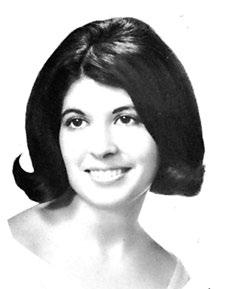
“It was an AMAZING feeling to participate in orientation with the young women admitted to the LEAD program. It made me remember my first days at Hartford College for Women— being given a beanie and being assigned a ‘big sister’ to help the first-year newbies. These young women were about to begin a journey that would take them beyond their academic education into real-world experiences and leadership development opportunities.
“After Hartford College for Women, my journey took many interesting turns. I graduated from Mount Holyoke College in Massachusetts with a major in sociology and a minor in psychology. Upon graduating, two exciting things happened: I got married and moved to New York City to take a position with the N.Y. Department of Child Welfare, Division of Foster Care. After two years, I moved back to Hartford and raised my two daughters until I went to work for a prominent downtown Hartford law firm as a legal assistant. Then, I joined one of Hartford’s premier insurance companies in the law department and made my way through the organization as a major researcher and author on public policy issues and a
range of liability and risk issues, organizing and focusing on the issues management function for over 30 years. Prior to my retirement, I published a quarterly newsletter on risk and regulatory issues. During my retirement, I joined The Women’s Advancement Initiative for a couple of years contributing to program research and marketing.
“As I reflect on my days at Hartford College for Women and time spent participating in orientation for LEAD students, I am excited. I remember as the day progressed at orientation, you could feel the energy in the air. As I watched new students mingle and listened to them share fun facts and their goals, and walk, bright-eyed, over the bridge individually and united as one in the LEAD community, little did they know what I knew: that the next four years in this program would be among the most rewarding of their lives. I wish them all well and hope to cross their paths many times in the years to come.”
Martha served on the Hartford College for Women Class of 1966 50th Reunion Planning Committee.

In 2016, the Class of 1966 also shared the following bios in their 50th reunion book:
“After graduating from Mount Holyoke College in 1968 and Columbia University School of General Studies in 1969, I worked as a licensed massage therapist in Delaware. I had a private practice and worked with veterans at the V.A. Hospital. I served on the board of the Anthony E. Weymouth Foundation and was active at UUFN and the local senior center. In 2016, I started writing my first book with the working title, User’s Guide to Human Body. I’ve traveled to Prague, Sweden, Paris, England/Scotland/Wales, Mexico, and Arizona, and also lived in Hungary for a year.”
“I was married in 1966 and had my reception at Cheney Hall. Does anyone remember that? After that, I went into the Peace Corps to Panama and finished my degree at the University of Delaware. I majored in Spanish and then taught in Delaware for three years. As a full-time mom, I raised three kids for over


fifteen years. I was divorced, worked in various fields, and remarried. That lasted 20 years, divorced again, and now I am happily remarried (feel like Liz Taylor...I wish), retired, and living in Florida, playing lots of bridge and working toward gold Life Master. My bridge career started in Butterworth when I had no clue. Miss Johnson would be mortified to know it was the most valuable part of my Hartford College experience.”
“I returned safely to Paris and then New York City where, with my savoir-faire, landed a job at a high class restaurant as a hostess, which evolved into a dining room manager position there, and for the next ten years, some other very fancy joints. Even though I still had time to paint and write, it wasn’t where my heart was.
“In 1987, I returned to Paris and la vie d’artiste. I feel very fortunate to still be here—living in a studio in Montmartre. There was a time when, perhaps I was too much a bon vivant. Now, my pleasures are going up the hill with my border collie, Boston, giving directions to tourists, and painting, painting, painting. I post my work often on Facebook, mblakeart, and my blog, paintingparis.blogspot.com, which has reached more than 42,000 visits. I wish all my classmates a happy reunion and am anxiously awaiting their saga.”
“From Hartford College, I went to Ohio State University where I studied economics, marketing, football, and eventually, fashion retailing which offered a training period in a New York department store for credit. I chose Lord & Taylor on Fifth Avenue, which I found exciting, and after graduation was easily employed as an assistant buyer, which meant counting nightgowns, bras, and panties. I left Lord & Taylor for a position as sales representative at IT&T in the downtown Wall Street sector. Within a few months, I was certain that the rat race was not for me. I enrolled at The Art Students League just as the flower children were returning home from Woodstock. I continued at The League for two years earning my living working nights as a waitress.


“In November 1972, I went to Paris because a man I had met on Martha’s Vineyard said that he couldn’t live without me. In fact, he could, but I stayed in Paris anyway and eventually learned to speak French. In 1975, I had my first one-person show, followed by two important group shows.
“I spent six months traveling about in India which was about the most enriching experience in my life so far. I certainly learned about color.
“Some of my fondest memories of Hartford College for Women revolve around Butterworth Hall and its surroundings. I remember serving tea at 4:00 p.m. I learned to be a “pourer.” I was so proud. I enjoyed the annual father-daughter property cleanup. I was proud of my dad, an immigrant with limited formal education, when Laura Johnson asked him to share his knowledge of plants and grasses. He was so pleased! Hartford College for Women set me up for university and workplace success by providing a strong academic and social foundation in a caring environment. I have worked in business and in education and continue to work part-time. I would advise my college-age self to, “Enjoy educational and career pursuits that take divergent paths. The excitement of learning is lifelong. Your talents and abilities are limitless. Go for your dreams!” Rosanne served on the Hartford College for Women Class of 1966 50th Reunion Planning Committee.


“I am retired from my career as a human resources corporate professional and now I enjoy my volunteer work with Cooperative Christian Ministry; Music and Worship Chair, Side Walker with Wings of Eagles Ranch (horseback riding for special needs children), and CROP Walk County Planning Committee. I am the proud mom of four daughters and enjoy time with my grandchildren. I love to be in the kitchen and am writing a ‘dee cookbook.’ I lived in Taiwan for several years. I enjoy my life in North Carolina and we are planning another trip to Europe.”
development projects, travelled extensively, met lots of interesting people, made some very good friends, and had a wonderful family life. Although my first marriage ended in an amicable divorce, we produced a delightful daughter.
“As the years slipped by, I was reacquainted with a colleague who occupied a cubicle next to mine more than 25 years ago. A civil engineer and planner by training, he became my life companion. Our families circled the wagons when I was diagnosed with a potentially lethal sarcoma cancer eight years ago. Cancer treatment was aggressive and thankfully the medical team at Johns Hopkins saved my life. I will be forever indebted to their compassionate care, although I must now walk with a leg brace and cane. I took early retirement to spend more time with family and friends. Except for a recent fall and broken hip, I remain in remission.
“I now volunteer at Howard County General Hospital where I work with recently diagnosed cancer patients and am actively involved with the Friends of the Sheridan Libraries at Johns Hopkins University. I have many wonderful memories of the times we had together. I miss seeing you all and sharing stories of our life at Hartford College.”
“After Hartford College, I decided to attend George Washington University in Washington, DC. Smitten with Potomac fever, I moved to Washington in 1966. I received my undergraduate and graduate degrees in urban and regional planning. Then, I began a 40-year career in Washington working in both the private and public sectors—first as a community planner, and then, directing the long range planning program for the Department of Planning in Montgomery County, Maryland. I worked on many innovative rural preservation and urban
“For last 15 years, I have been a meeting and event planner with AvalonBay Communities, Inc. in Boston, Massachusetts. Two years ago, I moved to a beach condo in Hull, Massachusetts, after 40 years living in the great colonial town of Hingham. I am divorced with the great fortune of having my three great children and their spouses and seven grandchildren all living in the surrounding towns. Although I am hopeful to be traveling more (when I retire in a year or so), in the past few

years, I thoroughly enjoyed trips to Scotland to see a son in graduate school and a trip to Rome and the Amalfi Coast with high school friends to celebrate our 50 year reunion.”
Sharon Anne Kasulis Byron ’66 Linda Ann Demikat ’66
“In June 2011, I retired from a 41-year career in education. I started as a French and Spanish teacher, and then became a foreign language department head. From there, I was the assistant principal and principal in three Connecticut public school districts, Woodbury-Bethlehem, Hartford, and Norwich. My retirement has been fulfilling and very, very busy. I spent a lot of time with my horse, An Appendix, and took riding lessons. I prefer riding in an arena to trail riding. While my horse is now retired and just entered an equine retirement community, I expect to see him regularly and volunteer at the farm. I am very involved with yoga, including asana practice, philosophy, and mantra practice. Lastly, I volunteer at Hartford Hospital where I visit patients, and at Hartford Public Library where I tutor immigrants to pass the U.S. naturalization test. I am busy, fulfilled, and eager to learn and read as much as I can. Life is good.”
Linda served on the Hartford College for Women Class of 1966 50th Reunion Planning Committee.
“After graduating from Hartford College and completing my bachelor’s degree in English at the University of Hartford, I lived on Ramstein Air Base in Germany for six months to road test my German at Oktoberfest, train in a Montessori preschool, and tour Europe’s castles, churches, and artifacts. I have seen most of the states of the United States, climbed to the summit of Mt. Katahdin, and become a certified, advanced open water diver at 100 feet deep in Gloucester, Massachusetts.
“Marrying in 1973, I completed my MBA at Rensselaer Polytechnic Institute and became a consultant in 1978. We also started our family—three sons who now enjoy health-centric living in North Carolina, Maine, and Seattle, Washington; and a daughter in Colorado. Our two Portuguese water dogs, have passed on. In 2003, my daughter and I explored the Mayan ruins and pyramids in Cancun, so she could practice her Spanish and experience marine life. In 2016, my day begins with a morning meditative swim in my hometown, Simsbury, Connecticut, and ends with quieting yoga or robust Zumba classes. After a career in technology, my life’s work in writing, photography, and graphics evolves to creative greeting cards; some books published, and some drafted. My book club of 30+ years nurtures me. I enjoy seasonal hiking, skiing, and cycling along with performing arts and art festivals. I also volunteer as a photojournalist and fundraiser with Groton Long Point Fire Department. I plan to explore solar sustainable, off-the-grid, living in Colorado this summer with my grown children and two inquisitive grandsons!”
Sharon also served on the Hartford College for Women Class of 1966 50th Reunion Planning Committee.

“After college, I was a city planner at the Hartford Redevelopment Agency and then went to law school. I chose the University of Connecticut’s School of Law because it offered evening classes, the school was near my house, and I wanted to be home with my two young sons (one born during my second year). Law was actually a wonderful choice for me. Eventually, I worked as an assistant attorney general at the Office of the Attorney General for over 25 years. I am now retired, my husband and I are about to celebrate our 46th anniversary, and I am crazy in love with our amazing five grandchildren.”
Suzanne Lea Meny Woodward ’66

“After 37 years working for CIGNA as a systems analyst, I retired early. I have one married daughter and three terrific grandkids. I have an in-law apartment at their home and serve as Registrar of Voters in Woodstock. I do a lot of work on town commissions and with the Education Foundation. I have traveled to Europe many times and to Alaska and Russia. I spend several weeks at the beaches in Rhode Island every year. It’s a good life!” Suzanne also served on the Hartford College for Women Class of 1966 50th Reunion Planning Committee.
Judy Romano Saccente ’66“After graduating from our alma mater with a certificate in retail, I decided to pursue a different career and attended the Fashion Institute of Technology with a major in communications and earned a second associates degree. However, after a year with Seventeen magazine, I decided the fashion industry wasn’t for me. I married briefly in the 70s but that wasn’t for me either so I moved to New York City to pursue a career in the corporate world. I spent 25 years with the global management consulting firm, McKinsey & Company, where I last served as director of administrative services. It was a wonderful firm and a very satisfying life. I retired in 2005 at age 60 to Palm Springs,California, with my domestic partner of 18 years, Anthony. He has two beautiful daughters; and we now have one adorable granddaughter, Sofia, age three, from his older daughter; and a second grandchild on the way from the younger daughter. They all live in Baltimore so we get back East a couple of times a year to visit. Palm Springs is paradise, and we have a wonderful life and terrific friends here. I will always value the excellent education I received and experiences I had at Hartford College for Women. Best wishes to everyone!”

“I graduated with my bachelor’s degree in economics from Marymount College in 1968. After graduation, I moved to Washington, DC. I began work on the Humphrey Campaign for the president, then at the Treasury Department. I also worked in the Senate initially for Senator Ribicoff on the Governmental Affairs Committee and, ultimately, on the Senate Appropriations Committee as staff director of the Subcommittee on Health, Education, and Labor. I was involved in many hot button legislative issues over the years, including funding the first NIH research of HIV/AIDS and then the clinical trials of AZT. With two children by my first marriage, Andrew and Mason Ingram, and three grandchildren, in 1984, I married Lowell Weicker. We have a combined family, seven sons, eleven grandchildren, and a black lab named Cricket. In 1990, Lowell was elected Governor of Connecticut and we moved from Greenwich to up the street from Hartford College for Women.

“My various interests include reading, cooking, needlepoint, tennis, scuba diving, and travel. I have also served on numerous state and national boards. I am currently co-chair of the Connecticut Audubon Society’s Roger Tory Peterson Estuary Center Board. Other than Connecticut, I lived in Washington and Virginia (Old Town Alexandria and Charlottesville). We had a home on Lake Como, and we winter in St. Croix. I am now happily settled in Old Lyme, Connecticut, right across from an ice cream shop! I loved Hartford College for Women and am grateful for the experience there.”
Carol Lynne Zimmerman de Montrichard Dalléas ’66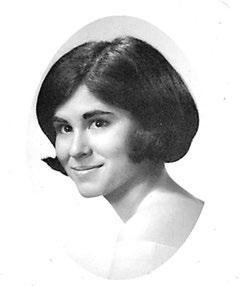
“I left Hartford College directly for France…perhaps to prove to Madam Grattan that I could learn French. With French more or less mastered, I did my art history and fine arts studies in Paris, married a French count, Charles-Henri de Montrichard, had four children and became a widow at 37. I raised our children while working as a presenter and artistic director for a French cultural center for 18 years. I then became an agent for European artists specialized in performing for children and family audiences working mainly in North America and Asia in both small and large venues (from the Eric Carl Museum to the Kennedy Center). I just retired this past year with a final New York State tour with the German artist, Matthias Kuchta.
“I now have a little more time to spend with family on both sides of the Atlantic and in Switzerland. I still live in our family home in the Bordeaux wine country with my husband, Bruno, a French psychiatrist. It’s here also that I founded and run my B&B, What’s Cooking in France? I organize small personalized culinary, wine, and garden tours. I would tell our classmates that I’d love to see them here in France sometime! For my tours I often have 8-10 guests. It would be fun to do a little French reunion with Madam Grattan’s students.”

“My two years at Hartford College for Women was an incredibly unique experience—a small women’s college with professors from a variety of well-known, high caliber, four-year colleges as well as resident professors. Having been at Hartford College for Women as a ‘boarder,’ my years were quite different from the majority of students who commuted to campus on a daily basis. I resided at Mrs. Haberstroh’s ‘Habby’s Boarding House’ on Elizabeth Street with approximately 15 other students—an easy three-block walk to the campus. It was truly a home away from home. This was especially important to me, as I wasn’t sure how far I was willing to be from my family. We had homecooked meals Monday through Thursday, and fresh linens delivered to our rooms weekly. We were somewhat spoiled!
“As a member of the singing group, The Hummels, I had the opportunity to participate in a variety of performances. One such evening was particularly memorable; we joined the Trinity Travelers to perform in the Institute of Living’s theater in Hartford before an audience of residents. We brought the joy of music to those gathered, and in turn left enriched by the knowledge that we had made a difference.
“There were so many memorable individuals in our community. Who can forget Professor Oliver Butterworth, his passion for English literature and keen interest in his students and Hartford College for Women. He would provide transportation and tickets on a regular basis to performances at the Hartford Stage Company and the Bushnell. All we had to do was sign up in Butterworth Hall and hop on his VW bus on the appointed day!
“Another beloved member of the Hartford College for Women community was Christine Lyman, the director of admissions and professor of speech and public speaking. As I recall, this class was a requirement for graduation. To this day, I am grateful for her wisdom, talent, and conviction in recognizing that the ability to speak before a group was not only a valuable skill, but surely possible for us all. Rounding out our college experience was a modern dance class led by Truda Kaschmann. She was a true inspiration in the importance of physical fitness for a sound mind and body.
“The small size of the student body was one factor that contributed significantly to the ability for Hartford College for Women to provide such a unique experience. Remember President Laura Johnson hosting each student individually for breakfast in her home? We would discuss our future plans and what the Hartford College experience meant to us. Her cafe au lait was legendary! She always exuded confidence and belief in each of her students and knew how to push us in the right ways to find it within ourselves.
“I can proudly say that a part of the Hartford College for Women legacy is that my older daughter began her years of higher education there as a member of the Class of 1994!
“How fortunate we were to have had such dedicated professors and staff who were invested in our total academic and social experience. The Board of Trustees were also regularly present to mingle with the students at events such as the annual luncheon in the gardens at Butterworth Hall. Dedication, commitment, resources, academic excellence, personal responsibility—we found it all at Hartford College for Women!”
Judith served on the Hartford College for Women Class of 1967 50th Reunion Planning Committee.
After graduating from Hartford College for Women, Karen Flowers earned her bachelor’s degree in economics from Brandeis University, and a law degree from the University of Nebraska–Lincoln (UNL). While graduating from college and going to law school, she taught 8th grade mathematics and 9th grade algebra at Middlebrook Junior High School in Trumbull, Connecticut, for two years.
In 1970, she moved to Lincoln, where her husband got a job at UNL. Karen served as traffic analyst for the Nebraska Department of Roads for one year before entering law school. After graduating from law school, she practiced law in Lincoln for 20 years. Her primary area of focus was family law. She was appointed to the District Court bench in 1996 and became the Honorable Judge Karen Flowers before her retirement in 2013.
Karen is a member of the Nebraska State Bar Association and was chair of the House of Delegates in 1996. She is also the past president of the Lincoln Bar Association and the Nebraska District Judges Association, and a former Master of the Bench in the Robert Van Pelt Inns of Court.
Prior to her appointment to the bench, she served on the board of directors of a number of civic organizations including Family Service Association, Planned Parenthood, and Leadership Lincoln. She was a member and past president of the Lincoln Lancaster County Commission on the Status of Women.

In 2018, Karen was the keynote speaker at the Hartford College for Women Class of 1968 50th Reunion. Students in the LEAD program and Karen’s classmates listened to her share some of her favorite Hartford College memories. She also encouraged
today’s students to keep moving forward while also giving back. Each year, Karen generously supports The Women’s Advancement Initiative’s Annual Fund.
“It was at Hartford College that I awakened intellectually. My high school record had been spotty—strong in humanities, weak in math and science. I remember feeling anxious when I arrived on campus in the fall of 1966, wishing my profile was more well-rounded. I was fairly sure that I could muddle my way through the required courses that are the backbone of most liberal arts curriculums. What a reflection this would be if I could report that through hard work and resolve I surprised myself and achieved what I didn’t think possible. Of course, I did not become a brand new person once I started college. My strengths were still my strengths; my weaknesses still present major challenges and I was immature in my ways. But my world was changed by this brand new opportunity to immerse myself in disciplines I had never encountered: psychology, sociology, religion, writing, and music appreciation.

“Once I was enrolled at Hartford College, I relaxed. Behind me were the dread of SATs, the jittery edge of wondering if I was worthy of acceptance to college, and the fear that I would fall short in competing for a place to land. I have no memory of anxiety regarding transferring to a four-year college. I knew I was at a solid school with a rich curriculum and inspiring professors, a school that was dedicated to finding the right match for each young woman determined to earn her degree.”
Alison received her master of arts in curriculum and instruction (K-6) from Keene State College and earned a bachelor of arts in English from the University of Wisconsin.
She co-authored The Life We Got: Losing Sight & Gaining Vision with her son, Neil. He was a young teacher and athlete when the discovery of a brain tumor catapulted him into a life of blindness. With his dreams shattered and the future uncertain, he began, with unwavering support from his family, rebuilding a life worth living and celebrating. A monumental step in his journey was the writing of this memoir, told from both of their perspectives.
Neil lived an amazing life following his diagnosis—a life full of undeniable challenges and remarkable accomplishments. He died in 2017, but not before he and Alison were able to present their book to the public. In 2018, Alison gave her first reading without Neil at the University of Hartford, and again virtually in 2022 to Hartford College for Women classmates and friends. Alison believes “writing can serve as a therapeutic tool to process, to make peace with, and to ‘own’ the unbearable.” She was honored to present this book talk again as a tribute to Neil, who embodied the resilience of the human spirit.

She lives in Brattleboro, Vermont, and is a former elementary school teacher and long-time yoga practitioner.
Rosanne Druckman
“After 50 years, there is a lot about Hartford College that I have forgotten, but one thing that still stands out is the time I broke into the library at Butterworth Hall. During this period of high anxiety, my older brother and his entire family decided to visit for a weekend, so our small apartment was inhabited by yelling and constant motion. It was no longer a place for me to study. I quickly figured out that a trip to Hartford College Library was in order. My brother, eager to leave the cramped apartment, happily agreed to drive me to the campus. Not thinking about Saturday morning hours for the library, I was surprised to find that the door to Butterworth was locked and no one was around. My brother, who was just going to drive off, was called back by the urgency in my voice as I yelled, ‘Wait!’ Not sure how to proceed, we both puttered around the outside of Butterworth, surveying the building and the landscapes until my brother noticed a partially open window. Somehow, he managed to get me inside. Relieved, I settled into the library for a few hours of studying. At the time, climbing in a window for the purpose of studying seemed like a natural thing to do.
“In many ways, Hartford College felt like a safe place. The honor code empowered us and assisted 18–and 19-year-olds to learn quickly about responsibility. Accomplished professors regularly encouraged us to challenge each other and ourselves. I will not forget how much Hartford College shaped me.
“After graduation, I received an undergraduate degree from Boston University and later earned a doctorate from Boston University in social work. Then, I worked at the United Way in Harford and Baltimore. I was an executive director and my job was to improve administration at colleges and work on issues that would improve the general community and the awareness
of resources available at each campus. My experience at Hartford College for Women was influential in the work that I did. The professors were interested in their students and the work that they did, which is important to me in my journey.”
“Looking at pictures, I began to reminisce, thinking of familiar sights, events, and even smells from our days at Hartford College for Women. I remember the big front door to Butterworth Hall. The tall trees around the driveway. I tried to remember the classes I took at Hartford College for Women. The choice was limited, of course. We had definite requirements to graduate, giving us a head start on fulfilling the basic requirements for the four-year degree we were expected to tackle next. English classes with Mr. Butterworth and Mr. Scanlon. I’d love to take those courses again. In hindsight, and thinking about my limited life experiences through high school, I know the bigger school and the late 60s culture would have swallowed me up if I hadn’t had my first years at Hartford College.”


“Our two years at Hartford College were a unique experience somewhat akin to a charter school. There was some of the usual structure of a college but with a twist. We were a small, limited number of students who commuted daily to a beautiful, hidden campus where we enjoyed professors and faculty from the larger, more ‘worldly’ colleges around us. No internet, no cell phones, papers done on typewriters, and real books found by looking in a card catalog, and wearing shirts on campus. Not today’s world, but still a good place to take some first steps toward becoming an adult. Definitely unique by today’s standards, but truly a great experience.

“Many of my memories are rooted in the beauty of the campus. The purple tracery of wisteria over the front of what is now Butterworth Hall as graduation approached. The thickets and benches where you could find a nook to study. It was a place for quiet reflection and a deep sense of belonging. Hartford College for Women’s unique value was best expressed by Laura Johnson when she called the college a place for ‘women who wanted to learn and teachers who wanted to teach.’

“Remember our extraordinary faculty, the distinguished permanent teachers, and those who came from Yale, Smith, and Mount Holyoke. Darlene Levy introduced the French Revolution by showing the movie Marat/Sade and the Middle Ages with The Seventh Seal. Oliver Butterworth teaching us to recite the Prologue to The Canterbury Tales written in Middle English. Can you still do it? Leo Weinstein, the Smith professor who taught a rigorous government course. Truda Kaschmann danced us across the sunlit floor of Cheney Hall. Hartford College for Women was a peaceful island that provided a space free to learn and think in a haven of good manners and high goals, under the watchful eyes of Laura Johnson. The motto, ‘Sibi constantem esse,’ is often translated as ‘to make them steady.’ A better translation is ‘to be true to oneself,’ and I think that was the living, guiding principle of the College. Today that principle is alive and well at the University of Hartford in The Women’s Advancement Initiative’s LEAD program. I was only there for a year, but I remember our class as a diverse collection of interesting women.”
Gretchen served on the Hartford College for Women 85th Anniversary Celebration and Class of 1969 50th Reunion Planning Committees.




For Jan, “places” in her world have always been so important. Those places are knitted together with the people and the happenings that inhabit them to become her memories … places in her heart.
Her first memories of Hartford College for Women were not from 1968, when she entered as a first-year student, but from 1963–64, when she was just 13. Her aunt Susan (Rokosa Woodcock ’64), who was just six years older than her, and whom she worshipped, often would pick her up in her VW Beetle and bring her to Hartford College for Women to hang out. She remembers thinking that Butterworth Hall was so beautiful! It was probably the grandest building she had ever been in, yet it felt so warm with its oak paneling, Oriental carpets, and college girls who all seemed to be friends. And then there was the sunroom, the second floor windowed nook, reached by its own staircase that felt like a secret perch among the trees.
That is when she decided that Hartford College was and would be her place!
When Jan began her education at Hartford College for Women, she was 17. She was very young, shy, and an only child. Her parents did not have the opportunity to go to college and her dad, a carpenter, did not have a formal education beyond the equivalent of ninth grade.

At Hartford College, she was challenged, yet at the same time, nurtured and encouraged. In that small community, it would have been impossible to hide. She made friends that have lasted to this day, yet she feels a strong sisterhood even with Hartford College for Women graduates she’s never met because they share such a unique and bonding life experience.
When she thinks back to 1968–1970, it feels like a sea change. She started college wearing shirtwaist dresses and Villager skirts, and two years later, she was wearing self-embroidered bell-bottomed jeans! She participated in her first protest march on Moratorium Day, a protest that Hartford College for Women supported and many professors joined in. Her mind and her soul were opened in countless ways by those two years at 1265 Asylum Avenue.

“Hartford College was especially wonderful for me. I had no perception of how empowering it would be for me to attend a school like that,” says Jan.
“The classes were small. The professors fostered an environment that encouraged students to engage in class discussions.”
More than anything, Jan says, she gained confidence. “Being part of such a small village where my opinion was valued, where I was noticed, where an interest was taken in me to make sure that I succeeded was just the thing for a girl like me.
“The two-year college didn’t see itself as a junior college, but rather as a transfer school,” she explains. Professors set the expectation that students would complete their bachelor’s degrees at well-regarded colleges and universities.
Students were taught how to think, how to approach a task, and how to work through problems.
Jan appreciated her professors’ respect for students. Her favorite professors were Rudi Haffner (biology) and Chaloner Spencer (music).
She hadn’t been exposed to classical music growing up in Newington, Connecticut. In Professor Spencer’s yearlong, twoand-a-half hour class, students listened to and learned about classical music. To prepare for quizzes where students had to listen to part of a musical piece and identify it, she and her classmates spent the mornings before class studying together.
“It was probably my favorite class in all four years of college. It made me happy!” she says. After graduating from Hartford College along with 62 other young women in 1970, Jan transferred to the University of Connecticut, where she earned
a bachelor’s degree in English. She worked for CIGNA for 17 years until shortly before her daughter’s birth.
Meanwhile, Hartford College for Women affiliated with the University of Hartford in 1991. At the time, educational opportunities had expanded exponentially for women. Increasingly, women were electing to enroll in co-ed institutions. This led to financial challenges for women’s colleges throughout the country. After extensive analysis, and with great reluctance and sorrow, Hartford College for Women closed in 2003. Jan and other alumnae worried about what would happen to their beloved alma mater. “There was a lot of bitterness among so many of us,” she says.
However, in 2008, she received a call from the Office of Alumni Engagement’s Elizabeth Abbe, who said she wanted to talk about Hartford College for Women, not the University of Hartford. Despite her reluctance, Jan agreed to meet with Elizabeth.
“She said, ‘All I want to do is hear about your experience at Hartford College and put you in touch with your friends who you might have lost touch with,’” Jan says.
When she recalls how Elizabeth helped her find a lost friend, her eyes well up. Thanks to Elizabeth’s efforts, she reunited with her three closest Hartford College for Women friends soon after that meeting. Elizabeth’s efforts also led to connecting Jan and her classmates with WELFund, which is known today as The Women’s Advancement Initiative, and Jennifer Sanborn, its first director. As one friend in the group faces a serious illness, the others are there to support her.
Jan attended the Celebration of Hartford College for Women and 85 Years of Educating Women in Hartford in June 2019 and was so impressed by the whole day, she volunteered to help plan her Class of 1970’s 50th reunion.
She enjoyed seeing artifacts representing all the decades of the College’s history. She admired and appreciated the Hartford College for Women Legacy Garden, installed in the heart of the University of Hartford’s campus. And she was pleased by the answer a young woman in the LEAD program gave when asked what she knew about Hartford College.
“It seems clear that from the very day they’re accepted into the LEAD program, the history, philosophy, and legacy of Hartford College for Women are woven into the soul of that program,” she says. “Those three elements of that day made it clear to me that Hartford College is indeed a valued part of the University of Hartford and still alive in the LEAD program and also in the respect the University has for the school.”
Since falling in love with the West End of Hartford as a Hartford College for Women student, Jan has never been far from campus. She moved to the neighborhood in 1976, and when they married in 1985, Jan and her husband, David, bought a Victorian on Girard Avenue. Since then, Jan has volunteered with the West End’s Noah Webster Elementary School, the West End Civic Association, and Watkinson School. For eight years, she worked as an educator for the Connecticut Historical Society. The Kleins still live in the West End and are passionate Hartford residents and supporters.
Jan served on the Hartford College for Women Class of 1970 50th Reunion Planning Committee. When the COVID pandemic forced the Committee to postpone their reunion, she and her classmates found creative ways to stay connected virtually through happy hours, a speakers’ series, and special presentations. In 2022, she joined alumnae from the Classes of 1971 and 1972 to plan and celebrate a combined 50th reunion, which was held in October.
“Hartford College for Women truly prepared me for life after graduation. I remember the notable faculty and staff, such as Laura Johnson and Larry Scanlon.”
After graduating from Hartford College for Women, Jennifer earned a history degree from the University of New Hampshire, and a degree in management from Webster University. Most notably, she served as a colonel in the U.S. Air Force for 26 years. Her service included time in England, Canada, Germany, and at the Pentagon. She also worked as a senior systems analyst with Dynamics Research Corporation.
At her 50th reunion, Jennifer was the keynote speaker and shared her personal and professional career journey and the challenges women faced at a time when advancement in military service was limited. We thank Jennifer for her service, empowering today’s students to achieve their goals, and for making a donation to add Laura Johnson’s favorite flower to the Hartford College for Women Legacy Garden.
“A time it was, and what a time it was...” at Hartford College for Women (1968–70)
“In 1968, the year some of us graduated from high school and began our time at Hartford College for Women, Simon and Garfunkel released the hauntingly beautiful song ‘Old Friends.’ The lyrics have taken on a deeper meaning over the years. They also remind me of those pivotal, special, wonderful two years at Hartford College for Women.
“I arrived on the Hartford College for Women campus as a shy, socially awkward 17-year-old. Despite the war raging in far off Vietnam and political upheaval at home, it was still ‘a time of innocence’ for me that grew into a ‘time of confidences’ shared with classmates embarking on a journey of their own. How lucky for me that some friendships have withstood the test of time and distance. I’m happy to say a number of these remarkable women remain my dearest ‘old friends’ and the tie that binds us began at Hartford College for Women.

“Even before arriving on campus, I recalled hearing stories of Professor Lawrence Scanlon. His reputation as a difficult and demanding instructor caused me to lose sleep and pray that I would be assigned to the more affable Oliver Butterworth for English Composition. My blood ran cold when I opened the course schedule to find I was placed with Professor Scanlon. Our memorable orientation at Camp Isola Bella found me in a two-person kayak with him. I have no recollection how this happened but I was terrified and speechless! And, while his class lived up to its reputation for rigor and the dreaded opaque projector brought me to tears, I learned research and writing skills that prepared me well for the academic and

professional experiences that followed. I wish I had said thank you, Professor Scanlon, for demanding more of me than I ever thought I could produce.
“During sophomore year, a number of us were studying and obsessing about Professor Haffner’s all-consuming biology exam. It was so important and I was so afraid of failure. Over the decades, my recollection may have dimmed but, as I recall, we had the one question in advance and it went something like this…follow the course a slice of cheese pizza takes from the time it enters the mouth to the point of elimination. It was a brilliant and deceptively complex assignment. We spent days frantically memorizing myriad bodily functions and the chemical interactions. Then, in his gentle way, Professor Haffner reminded us that what seemed to be of gravest importance at the moment would not be remembered on our wedding day. Fast forward 13 years to the evening of July 31, 1982. Michael and I exchanged marriage vows in the living room of Butterworth Hall. Needless to say, I wasn’t focused on Professor Haffner’s exam question. I wish I would have said thank you, Professor Haffner, for putting things into perspective.
“When I was age four, my parents thought I should take modern dance. The instructor was Truda Kaschmann. I had no real interest in the class and certainly showed no talent or ability. Thirteen years later, leotards were donned again in Mrs. Kaschmann’s modern dance class at Hartford College for Women. She warned us not to wear pantyhose, especially those with ‘control top.’ Why? Because our stomach muscles would weaken through lack of use. Of course, I did not heed her advice. After 35-plus years of wearing pantyhose to work nearly every day, I wish I would have listened. Mrs. Kaschmann, you were spot on!
“As Simon and Garfunkel also wrote, ‘Long ago it must be I have a photograph.’ One, taken on June 4, 1970, captures two young coeds preparing to graduate from Hartford College for Women. Both, in yellow and white dresses, are beaming broadly. Our proud parents are pictured as well. Their smiles and obvious joy are captured for eternity. ‘What a time it was!’
“It was my pleasure to serve on the Hartford College for Women Class of 1970 50th Reunion Committee along with Jan Zaleski Klein, Linda Kautz Macy, Shirley Zelinka Baucom, and Cindy Gilpin Winters. We held our meetings in Butterworth Hall.
“Today, there is a new space—the Hartford College for Women Reading Room at the University of Hartford. It holds the painting from Butterworth Hall that Michael and I exchanged our vows in front of more than 40 years ago. The room also has the grandfather clock, furniture, and other treasures from the glory days of Hartford College for Women. May they continue to be appreciated and enjoyed by today’s students. And may this lovely new room offer to all who visit a special place to study, plan, laugh, cry, commiserate, and especially dream.”
Rebecca served on the Hartford College for Women Class of 1970 50th Reunion Planning Committee. When the COVID–19 pandemic forced the Committee to postpone their reunion, she joined alumnae from the Classes of 1971 and 1972 to plan and celebrate a combined 50th reunion which was held in October. In February 2023, she spoke at the ribbon cutting for the new Hartford College for Women Reading Room on the University of Hartford campus.
‘There are places I’ll remember all my life, though some have changed.’ — The Beatles
“It’s been 50 years since I graduated from Hartford College for Women. And, OMG, many of us are older than 70. And yet, we all still remember Hartford College for Women, though we’ve probably lost those blue and white beanies we wore for the first few weeks on campus.
“In 1968, I thought I could only afford to live at home and attend Central Connecticut State College (CCSC, now known as CCSU), but a friend convinced me to go with her for a ‘Tea’

for prospective students at Hartford College for Women. I thought, ‘A Tea in 1968—seriously?’ I immediately fell in love with it. Being terrifically shy then, probably because of my hearing loss, and tired of just being a number at Conard High, I loved the intimacy of such a small college.
“I had work-study, so it actually turned out to be cheaper for me to go to Hartford College for Women than CCSC. When I started earning money, I always took every chance I had to donate to Hartford College for Women. Apart from that, I couldn’t believe how terrific the professors were. My teachers included a German professor from Yale, a psychology professor from Fordham, two Weinstein history professors from Smith, a music professor from Mount Holyoke, and so on. It was amazing, and perfectly located on a truly beautiful, special campus, where my dad could drop me off on his way to work and pick me up on his way home. I even had my wedding reception at Johnson House in the summer of 1971. Jennifer Fox ’70 was a bridesmaid.
‘All of these places had their moments with lovers and friends, I still can recall. Some are dead and some are living. In my life, I loved them all.’
“I truly enjoyed working on the Class of 1970’s 50th reunion with Becky, Jan, Shirley, and Cindy, with the help of Amy Jaffe Barzach and Dina Morris Lyga of The Women’s Advancement Initiative at the University of Hartford.
“At the 90th event, we can all reminisce together about going to Camp Isola Bella, the day-hop lounge, dancing with Truda Kaschmann, classical music with Chaloner Spencer, dissecting fetal pigs with Rudi Haffner, English with Larry Scanlon or Oliver Butterworth, speech with Christine Lyman, the library with Teddy Newlands, work-study serving afternoon faculty tea, being surprised that Math I was calculus with analytic geometry, and of course, Laura Johnson, and all the great staff.”
‘Though I know I’ll never lose affection for people and things that went before, I know I’ll often stop and think about them. In my life, I love you more.’
We thank Linda for serving on the Hartford College for Women Class of 1970 50th Reunion Planning Committee and sharing her college treasures for archives.
“I remember the first day I walked through the grand front door of Butterworth Hall and saw the magnificent Oriental rugs, the wood paneling, and the sun shining through the large windows. What a lasting impression!
“Those hallways were alive with students awaiting help from the office staff, reading the latest news and activities at the bulletin board, or even finding the hidden restroom under the grand staircase behind the dark paneling. The walk from the parking lot had its own challenges depending on the weather— rain, snow, or ice. It was the first year students were permitted to wear slacks or jeans and have a relaxed dress code.
“We had a variety of classes from the arts, languages, sciences, and electives, with some of the professors coming to Hartford College for Women from other local colleges. Their teaching provided us with the opportunity to get a priceless education. I recall my German I class with Frau Landau and classmate Linda Kautz Macy. I thought it would be an easy class for me since my family was German/Austrian and they spoke German at home. Little did I think that reading and writing German would be a challenge. I survived and, to this day, have my German I book on the shelf!
“In the summer of 1970, as we were all waiting for the fall semester of our junior year at various colleges and questioning what our future would hold, three of us planned a trip to Bermuda. It was a great time with Rebecca Friedman Danchak and Cindy Gilpin Winters that still binds our friendship today.
“It was on that trip to Bermuda that I met a Coast Guard Second Classman, whom I would later marry in August 1973 after

attending the University of Connecticut. We were fortunate to have the wedding reception at Johnson House and its beautiful gardens, with Janice Zaleski Klein ’70 as a bridesmaid. A memorable day for all.
“Through life’s ups and downs, the one constant comfort has been the friendships made from 1968 to 1970, my most cherished friends today, more than 50 years later.”
Shirley also served on the Hartford College for Women Class of 1970 50th Reunion Planning Committee.
in myself.” Anne built on this confidence and after completing her bachelor’s and master’s degrees, she eventually joined the newspaper industry, a career that lasted 30 years.
Anne Farrow graduated from Hartford College for Women in 1971. Her sister Kate was a 1972 graduate. Anne had a great time being at the school and shared that Hartford College for Women allowed her to further her education in ways she did not think possible. While at the school, Anne remembers interactions with President Laura Johnson. She says, “Miss Johnson always dressed in skirts and sweaters, cutting a classic New England figure. She was strict but quite approachable.” For Anne, it was inspiring to see a woman in power. She also recalls that Laura Johnson also seemed to know every girl by name. She recalls, for instance, that during her time at Hartford College for Women, “Laura Johnson was the academic adviser for every student, a role she took seriously, making sure she connected with students and got to know them. It is not surprising that with this knowledge of her students, Laura Johnson took an interest even after they graduated.” It was something that Anne appreciated especially after she graduated from Hartford College for Women. Miss Johnson helped Anne see herself in a new light as, “yet to see


“Our professors were from an array of four-year colleges as far away as Smith and Mount Holyoke. In small classes, they challenged us academically. Our staples were demanding courses, from composition to calculus to biology. In the seminar course on psychology, our professor taught research rather than memorization of theories. French class in Madam Grattan’s sitting room, yoga in the Butterworth Hall living room, personal guidance from President Laura Johnson and Librarian Teddy Newlands, art, choir, and dance…they were all in the mix. As we continued our development, some of us tapped the Career Counseling Center that opened in 1968. (I bet you didn’t know that Hartford College for Women was one of the first colleges to offer such resources.) So here we are, with professions and avocations. Many of us took paths we didn’t imagine in our first year. I suspect all of us would say that Hartford College was a valued part of the journey.
“After graduation, I started working at Hartford Hospital for a couple of years, and then worked at a hospital in New Jersey. Although it took me five years, I received a degree in both psychology and accounting. Then, I got an entry-level job at a Wall Street bank stop firm and went on to receive my master’s degree in finance. I then found my way into commercial banking. I developed expertise in banking through the eyes of an investor and spent seven years in the business. Hartford College for Women provided top-notch education along with writing, research, and critical thinking skills, all of which I have applied over the years. Today, I work for TD Bank.”
Irene served on the Hartford College for Women Classes of 1970–72 50th Reunion Planning Committee.
Carolyn’s favorite professor was Professor Scanlon. All of her favorite memories include gathering with other students in the living room. She also loved the library and beautiful grounds of the campus, especially the rose garden. Carolyn remembers the wonderful fragrance wafting from Madam Grattan’s apartment as she cooked French cuisine. Most of all, she remembers her fellow classmates and the wonderful faculty. After graduating from Hartford College for Women, she transferred to Smith College and received both an undergraduate and graduate degree in musicology. She then attended the University of Michigan and moved to New York City, where she worked under a music publisher. Prior to retiring, Carolyn worked as a music librarian at Connecticut College for 36 years, and as a music director at a church for nearly 32 years. She would like to give these words of advice to incoming LEAD students and her college-age self, “Build relationships, use networking, find joy every day, and be open to unexpected opportunities. Listen. Don’t make sharp judgments or decisions. There is always another side to a story.”
Like her sister Anne, Kate had a wonderful experience attending Hartford College for Women and a unique interaction with President Laura Johnson.

“Kate, what do you intend to do with your life?” That was the question posed to her back in 1972 by President Laura Johnson.

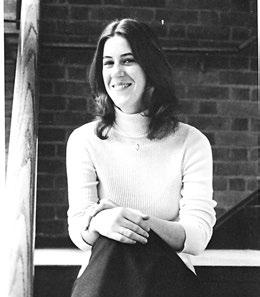
“In her usual straightforward manner, she looked me in the eyes and rolled out the question for which I had no ready answer. Clearly, she was not impressed by my very vague and unrealistic plans to be an Olympic track star! Life is full of defining moments for each of us. Miss Johnson’s question was a defining moment for me. When I reflect on that conversation and my career path, I am reminded of how those brief years of my life at Hartford College for Women transformed and shaped my future.”
Kate went to graduate school and planned to be an elementary school teacher. She completed the teacher certification, but there were no jobs. As she puts it, “It was one of those years where there are many teachers and not enough classrooms.” However, that question kept resonating in her head. What did she want to do in life? In the absence of a teaching job, Kate accepted an administrative position with Talcott Academy. She worked closely with the director to complete administrative tasks. Those brief years spent at Hartford College for Women and meeting Miss Laura Johnson was an experience that Kate will remember forever.
Kate has been a development professional since 1981, with 30 years of advancement experience in higher education at Quinnipiac University and St. Joseph College. She
has also served as director of corporate and foundation relations, director of development, associate vice president for development, and vice president of development and alumni relations at Quinnipiac University. She managed annual fund programs, three capital campaigns, major and planned gift programs, and worked closely with the president of Quinnipiac on strategic planning and board development. She is a certified fundraising executive, recognized by the Association of Fundraising Professionals. She also works with the Alzheimer’s Resource Center of Connecticut. She received her master’s degree from St. Joseph College and her bachelor’s degree from the University of Connecticut. She is an avid reader, gardener, and runner. Kate previously served as Board Chair for The Women’s Advancement Initiative (2011–18). We thank Kate for empowering today’s LEAD students and her dedication to women’s education.
Barbara Harris McWhirter ’72
While attending Harford College for Women, Barbara said her favorite professor was Dr. Haffner, who taught biology. Dr. Haffner was committed to the work, entertaining, and very encouraging toward the students. Her favorite memories include living in the student dorms. As a student from out of state and living in Mackenzie Hall, she had a great time meeting new people. After graduating from Hartford College for Women, she went on to receive a bachelor’s degree in agriculture from the University of Georgia, where she double majored in animal science and journalism. If given the chance to speak to today’s LEAD students, Barbara says, “The most important thing is to have a great time and listen to the voice inside to help you make life decisions. Life is what happens when enjoying other plans.”
 Pat McKinley
Pat McKinley
 Director of Housing and Student Affairs, Hartford College for Women (1974–80)
Director of Housing and Student Affairs, Hartford College for Women (1974–80)

“I landed at Hartford College for Women somewhat by accident, because at the time it was the choice that made the most sense for my family’s finances. The oldest of seven children, I was the first in my immediate family to go to college. My adviser at Hartford College was President Laura Johnson. She encouraged me to continue my education and personally helped me secure enough financial aid to move to Union College.
“The sense of being in a small community fostered by the Hartford College for Women administration, faculty, and staff, was one of the best things about being there. The friendships I made there were lifelong. My best and dearest friends are women I met at Hartford College. I remember the laughter from the coffee room, the pay phone in the library checkout area, the full living room on Wednesdays listening to symphony recordings just before a test in Mr. Spencer’s Music Appreciation course, the creative homemade costumes worn at the annual Medieval and Shakespeare’s Birthday dinners, weekends at Isola Bella, the handmade Valentine’s card each year from Professor Butterworth, the packed house on International Dinner Night, Mr. Jesse’s dog Charlie never being further than five steps behind him, and surviving the Blizzard of ’78 snowed in on campus. How fortunate I am to have been part of a community of wonderful, smart, and creative people where the quality of the student experience was always the primary focus.
“Today, The Women’s Advancement Initiative has programs and opportunities that encourage participants to think about their futures and to think for themselves. This is a similar atmosphere provided at Hartford College for Women.”
Pat served as the Director of Housing and Student Affairs at Hartford College for Women (1974–1980). She was a longtime University of Hartford regent and served as a board member for Greater Waterbury Health Network, Mercy Housing & Shelter Corp, United Way of Greater Waterbury, and the Connecticut Women’s Hall of Fame. She received her EdM in administration, planning, and social policy from Harvard Graduate School of Education and a bachelor’s degree in American Studies from Union College.

We thank Pat for her gifts to The Women’s Advancement Initiative, sharing historical documents from Hartford College for Women, giving a special presentation on “The Laura Johnson We Knew,” and serving on the Hartford College for Women Classes of 1970–72 50th Reunion Planning Committee.
out of the Hartford College easier for me. However, I recognized that if your high school years weren’t the best reflection of you as a student, you got a chance for a do-over at Hartford College for Women.
“After graduation, I obtained a bachelor’s degree at Skidmore College and a master’s degree at Yale Divinity School. I worked for several small churches as their church musician and then changed focus to do graphic design work and writing/editing for journals, brochures, and newsletters. I loved being in the West End of Hartford and live there today with my husband.
“My advice for young women today is to “have confidence in your abilities. If you need help, ask for it. Today, the LEAD program at University of Hartford provides exactly that.”
Helen graduated from Hartford College for Women in 1976 and the University of Hartford in 1979. She is a member of the Rosen Society, which is composed of alumni, parents, and friends of the University of Hartford (and Hartford College for Women) who offer loyal philanthropic support and want the best education and experience for each new generation of students. When she was a freshman in college, Helen’s mom was also a freshman at Hartford College for Women. Many of her family members also attended the University of Hartford.
Joan Pritchard ’74“I was in the last class to live in the dorms at the old Hartford Seminary across the street and the first to occupy the new townhouses on campus. It was an interesting transition for both students and administration in figuring out how to get our needs met (toilet paper, anyone?). Being able to walk off campus in about five steps was quite unique.
“Hartford College for Women was very much like the secondary school that I came from—a small, private school for women with an excellent faculty. That made the transition both in and
Her fondest memory at Hartford College for Women is jumping in her parents’ van, getting her friends together, and traveling to New York City. Helen shares, “There is an amazing advantage to having women’s education, as it is empowers, educates, and creates a sense of community for women from different backgrounds and ages.”
Her overall experience at Hartford College for Women was short but extremely positive. After graduating, she went on to study art and got a degree in advertising and design. Helen worked for advertising companies and was married very young while having her first child at age 40. She has lived a great life and it is not over yet. Her college experience was very empowering, not only for her, but also for her husband and his family. She married into a Sicilian family and was one of two women with college degrees in the family. If Helen could speak to her younger self, she would say, “Study harder, show
up more often, and take it seriously as college goes by so fast. Be more diligent and aggressive academically.” Her advice to today’s students would be, “Don’t take your education lightly or the sacrifices made by women before you since their accomplishments have gotten you to where you are today.”
Prior to CD&R, Sandi was group worldwide chairman of Johnson & Johnson, where she led the consumer and medical devices businesses and was responsible for the corporation’s global supply chain, as well as its technology strategy and operating infrastructure. Previously, Sandi served as chair and chief executive officer of Bayer CropScience AG, chief executive officer of Bayer Medical Care, and president of Bayer HealthCare AG’s Diabetes Care division. She started her career at McKinsey and has held executive positions at Medco Health Solutions (formerly known as Merck-Medco), Nabisco, and Whirlpool. Currently, she is chair of the board of the American Academy in Berlin and is on the board of trustees of the Institute for Advanced Study, the world-renowned center for science and humanities research in Princeton, New Jersey. Sandi is also chair of Volastra, an early-stage life science company, as well as Aster Insights and Cynosure.
“I have many fond memories of Hartford College for Women— the vibrancy of the conversations with so many bright young women, President Johnson’s teas, Fran’s amazing cooking and big heart when you were having a bad day, and the pranks we played on each other in the quad. I saw so many amazing role models who instilled in me that I could do anything irrespective of my gender.
“Most importantly, I learned how to write well from the mandatory freshman English class. I learned how to find my voice from Ms. Lyman’s speech class. I learned how to carry myself through life and show up in a room with presence despite being so short from Ms. Kaschmann’s dance class (and she was in her eighties!). All of these things helped prepare me for having a very successful academic run after Hartford College for Women. I attended Princeton and while at Cornell, I won the highest honor across all of social sciences for my thesis, thanks to learning how to write. I also enjoy an exciting and fulfilling business and philanthropic career.”
Sandi received her bachelor’s degree in government from Cornell University and an MPA in applied economics from Princeton University. She is currently an operating partner at Clayton, Dubilier & Rice (CD&R) and serves as lead independent director of the Microsoft board of directors.
Earlier in her career, she received a fellowship from the Robert Bosch Foundation in Stuttgart, Germany, and spent a year serving with the German Federal Ministry of Finances and the Federation of German Industries. Sandi was formerly the chair of the conservation research charity EcoHealth Alliance (previously called Wildlife Trust) and served on the board of directors at Dun & Bradstreet.

Sandi often advocates for women in business and was featured in a multi-part series of interviews on the subject by Forbes in 2011. In 2013, the National Association for Female Executives presented her with the Woman of Achievement award. In 2014, she received the Corporate Vision Award from Gilda’s Club, New York City, a charity foundation supporting cancer victims and their families. That same year, Forbes ranked her at number 20 on its list of the Most Powerful Women in Business. In 2015, The Committee of 200 named Peterson the recipient of its annual Corporate Innovator award. She has appeared on Fortune magazine’s list of most powerful women numerous times and was featured on the magazine’s inaugural list of leaders changing healthcare.
In 2019, she attended the “Celebration of Hartford College for Women and 85 Years of Educating Women in Hartford.” We thank Sandi for being a trailblazing businesswoman. We applaud her philanthropic spirit by continuously giving to The Women’s Advancement Initiative, LEAD program, and Hartford College for Women Legacy Fund.


During her tenure at Hartford College for Women, there was an expansion of offerings for adults, including programs for women who would later be called “displaced homemakers,” women returning to the workforce precipitously after being widowed or divorced. Some programs were also developed to attract members of minority groups.
When Dr. Davis became president in 1976, she knew firsthand of the difficult transition many women faced when they had been in and out of academia or the workforce for a number of years while coping with family responsibilities. Her own experience had taught her the importance of a supportive environment for women returning to school or to the workforce. She had been the only woman in her master’s degree program in public administration at the University of Connecticut.
She stayed at Hartford College for Women for three years, departing to become assistant to the president of Mount Holyoke College in 1979. At that time, Hartford College for Women was still firmly placed as a liberal arts college devoted to the liberal arts. However, the student body was changing and the college was expanding its student base by creating flexible, non-degree programs for both enrichment and vocational training. Her tenure at the College also marked the creation of the College Sampler, a series of noncredit courses for adults, and expansion of courses at the Counseling Center.
Dr. Davis earned her bachelor’s degree in 1949 from the University of Minnesota and received a master’s degree from the University of Connecticut in 1955. She taught political science at the University of Connecticut and attended Yale

where she received a Ph.D. in 1974. She served as associate professor of political science and chair of the Social Science Department at Keene State College beginning in 1971.
We appreciate her contributions to women’s education and supporting the Hartford College for Women Legacy Fund and The Women’s Advancement Initiative.
Excerpt from:
University of Hartford Archives Blog (2010, June 4). The Joan Davis Years. http://universityofhartfordarchivesblog.blogspot.com/2010/06/joan-davisyears_04.html
Miriam “Mims” Brooks Butterworth Acting President, Hartford College for Women (1979–80)When 20-year-old college student Miriam “Mims” Brooks Butterworth had the chance to study in Germany in the summer of 1938, she said yes, despite the rise of the Third Reich.
When Governor Ella T. Grasso asked her to serve as the first woman commissioner on the Public Utilities Control Authority in the late 1970s, she said yes, before learning what the job entailed.
And when a friend invited her to join 240 women and men from 42 countries on a peace train to a World Conference on Women in Beijing, Mims, then 77 years old, said yes, not letting her age deter her.
Her willingness to live fully and embrace challenges inspired The Women’s Advancement Initiative to adopt her “Just Say Yes” philosophy as a core value of its LEAD program for women students. Additionally, she encouraged students to give themselves permission to say “no.” In turn, she said, The Women’s Advancement Initiative’s commitment to educating women from diverse backgrounds and preparing them to reach outside their comfort zones motivated her to give annually and to create the Miriam and Oliver Butterworth & Family LEAD Program Endowed Fund. Her husband, Oliver “Bud” Butterworth, was a beloved English professor at Hartford College for Women.
The Women’s Advancement Initiative’s LEAD program prepares young women to work toward issues to which Mims devoted a lifetime—living in a democracy with freedom of the press, a just legal system, equal opportunity for all, and minimizing the negative impact of climate change.
“They’re encouraging women to be leaders,” said Mims, who served for a year as acting president of Hartford College for Women from 1979 to 1980. “I tell people: We don’t need to worry if people get a broad education.”
Historically, Hartford College offered an affordable way for young women to earn a two-year associate’s degree and complete their bachelor’s degree at prestigious colleges in the region. Mims said she appreciates the commitment that The Women’s Advancement Initiative makes to create an inclusive environment for women students.

Through a lifetime of activism, this extraordinary 100-year-old woman defied categorization. A former history teacher, wife, and mother of four, she met Eleanor Roosevelt at the American Youth Congress of 1939 in Washington, D.C., attended the Paris Peace Talks in 1971, and worked as a lifelong champion of peace and justice.
Her inclination to accept challenges and opportunities led to her “Just Say Yes” philosophy, the title of her 2010 memoir. Mims lifelong high regard for education and opportunities to learn inform The Women’s Advancement Initiative’s LEAD program, which helps women find their competencies, channel their strengths, and hone their skills—and whose
design was inspired by the way students at Hartford College were supported and challenged.
“Rather than pontificate on what others should do, Mims led by example. When she and her husband invited Hartford College students to their home to make ice cream, she engaged students in conversation and showed interest in their education, their ambitions, and their brains,” says Pat McKinley ’72, who worked at the College when Butterworth served as acting president.
“The thing that always struck me about Mims is her intellect, her interest in ideas and in encouraging people,” says Pat. “She always had multiple interests and continued to pursue them.”
In spring 2018, The Women’s Advancement Initiative’s Dorothy Goodwin Scholar Taylor Ugrinow, and videographer Kyle Conti, documented the amazing life and legacy of Mims Butterworth. The Just Say Yes documentary, created in collaboration with University of Hartford faculty mentor Susan Cardillo, is a remarkable tribute to an extraordinary woman. Watch it on YouTube (search “Just Say Yes: Mims Butterworth Documentary”).
On July 9, 2019, Mims Butterworth died in Bloomfield, Connecticut, just a few miles from her childhood home. She was 101 years old. We celebrate her as a lifetime champion of peace, justice, and women’s education.

